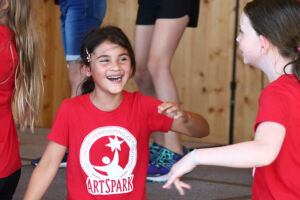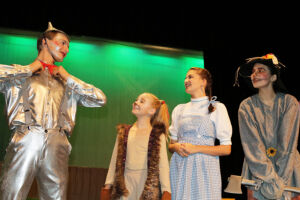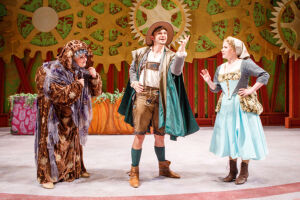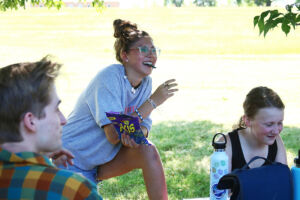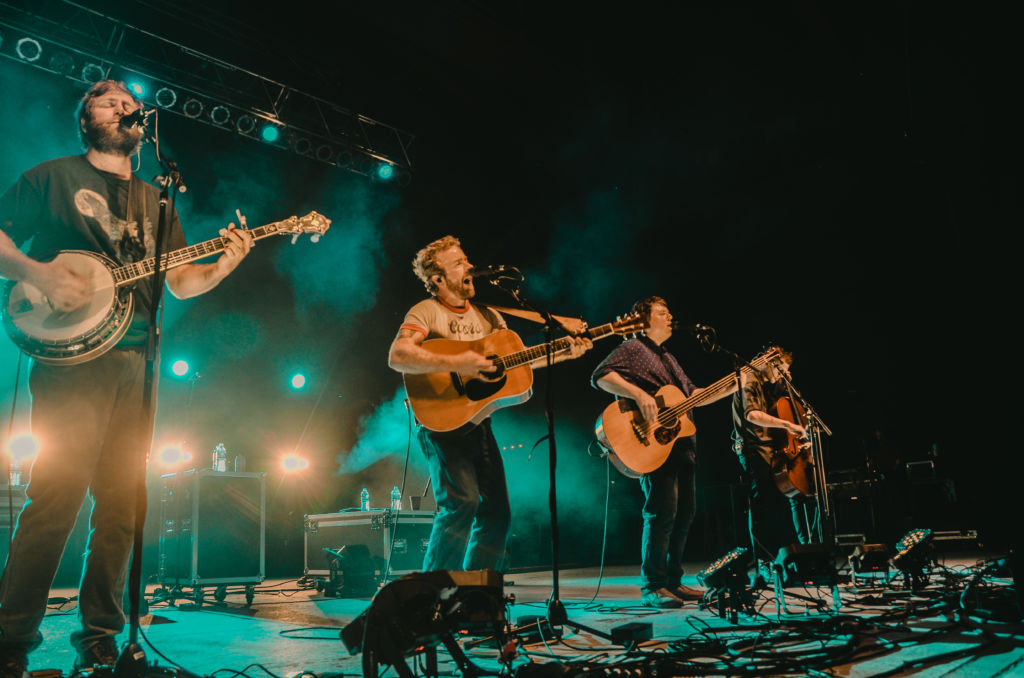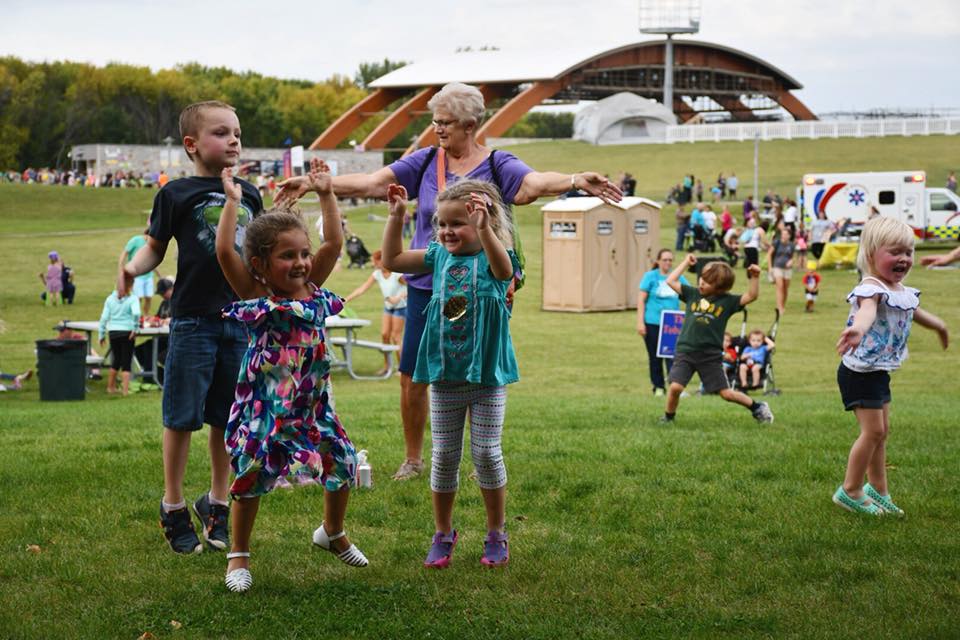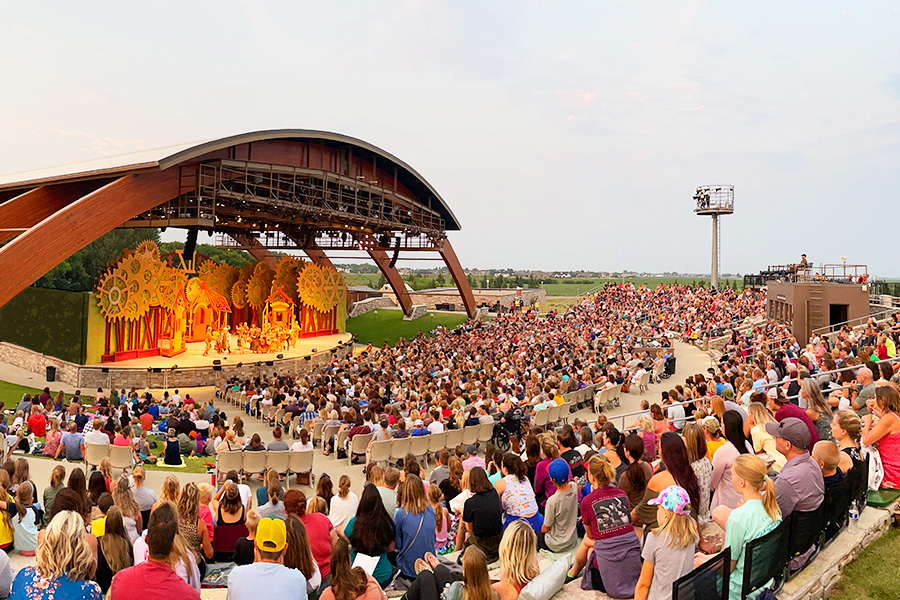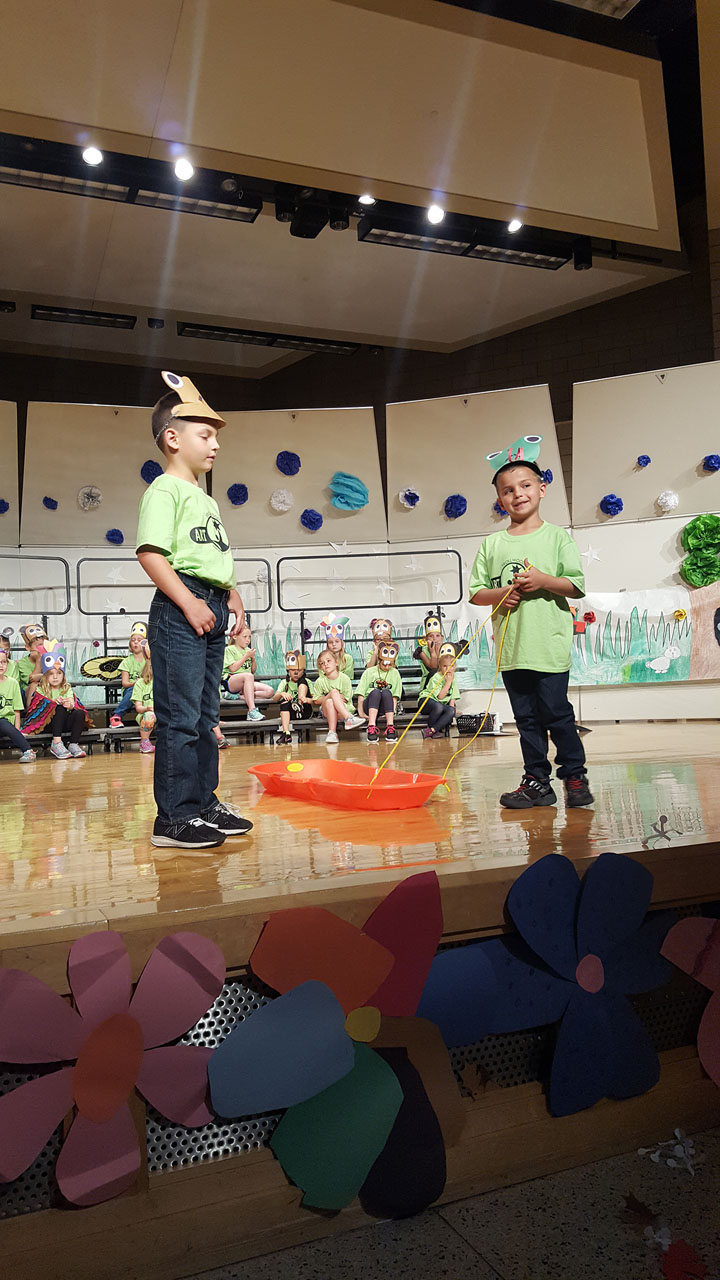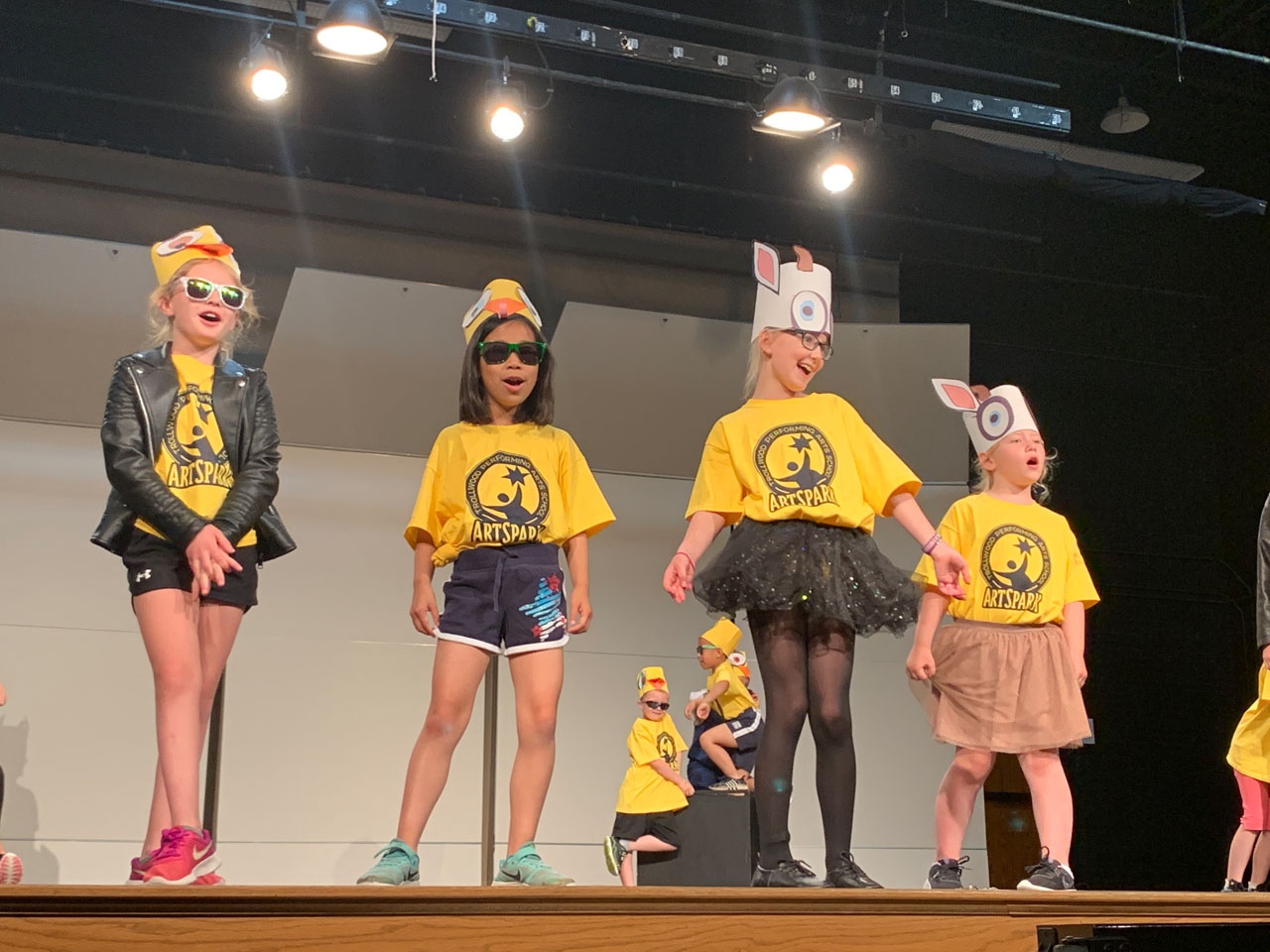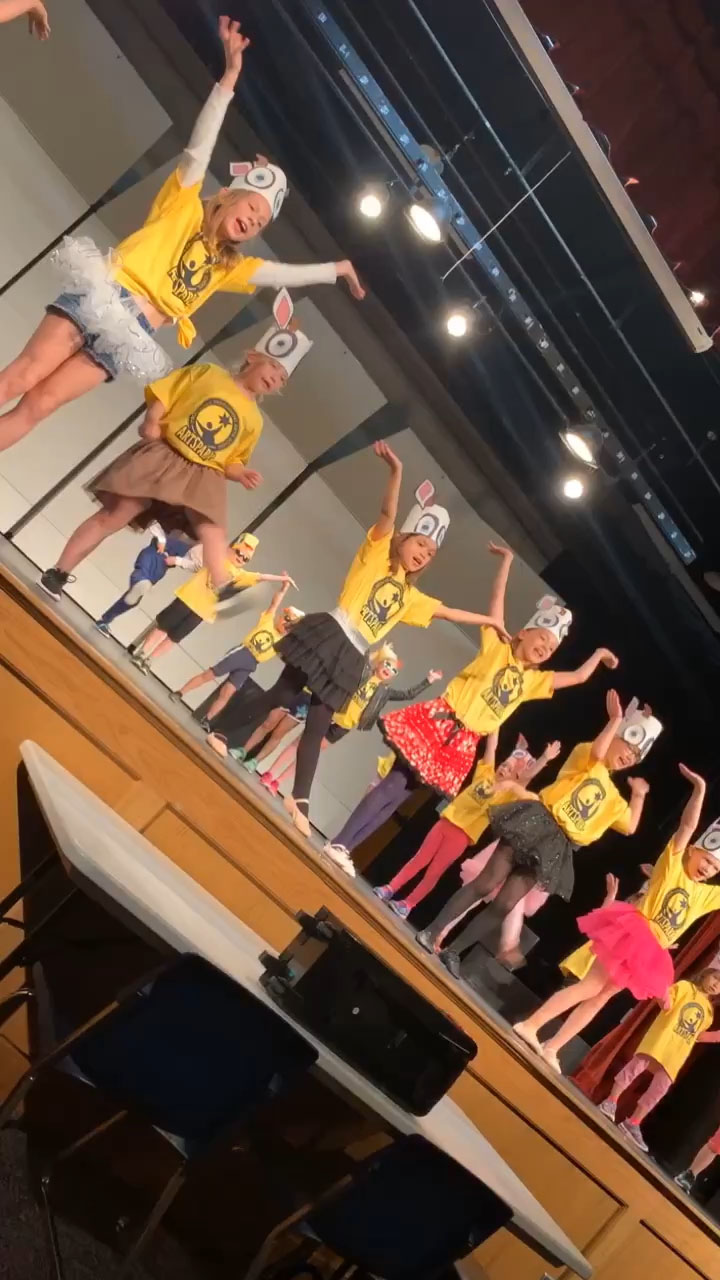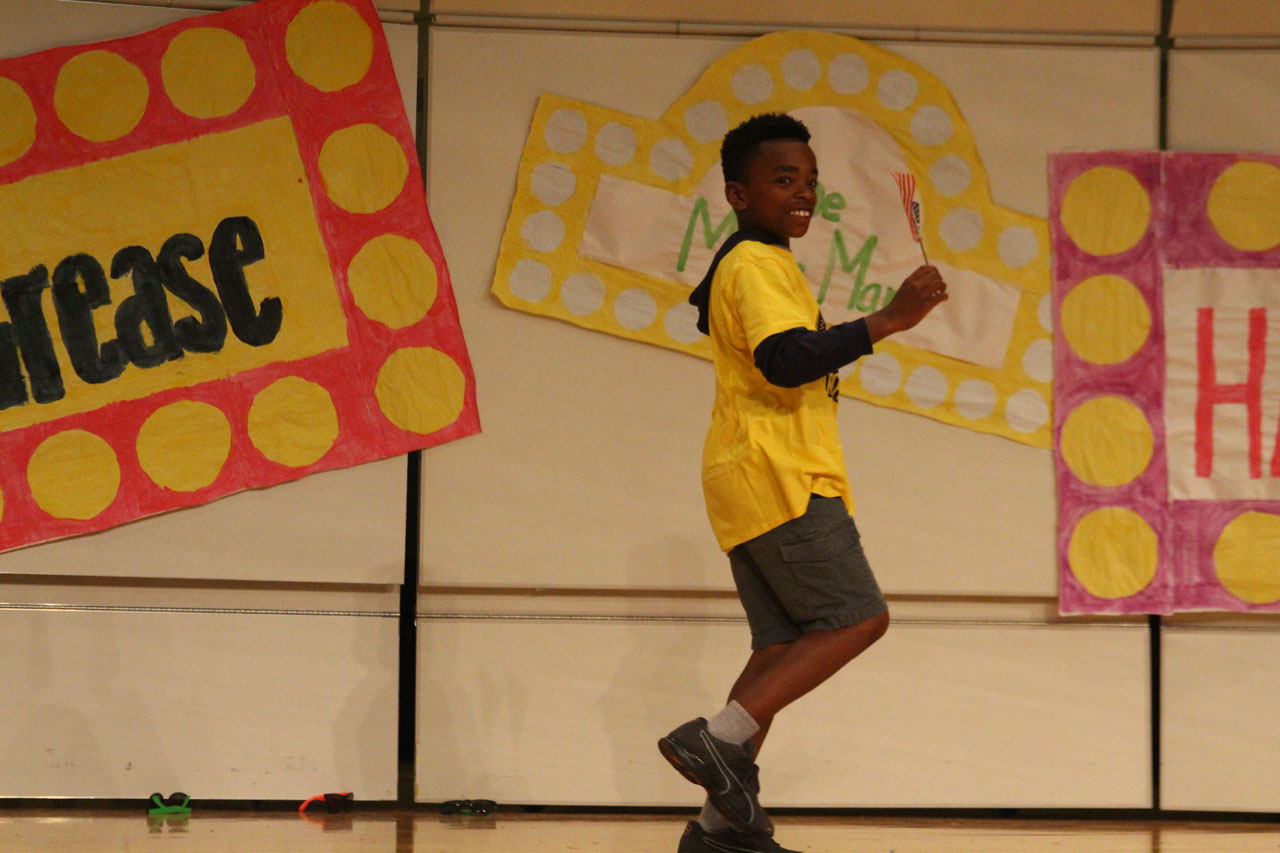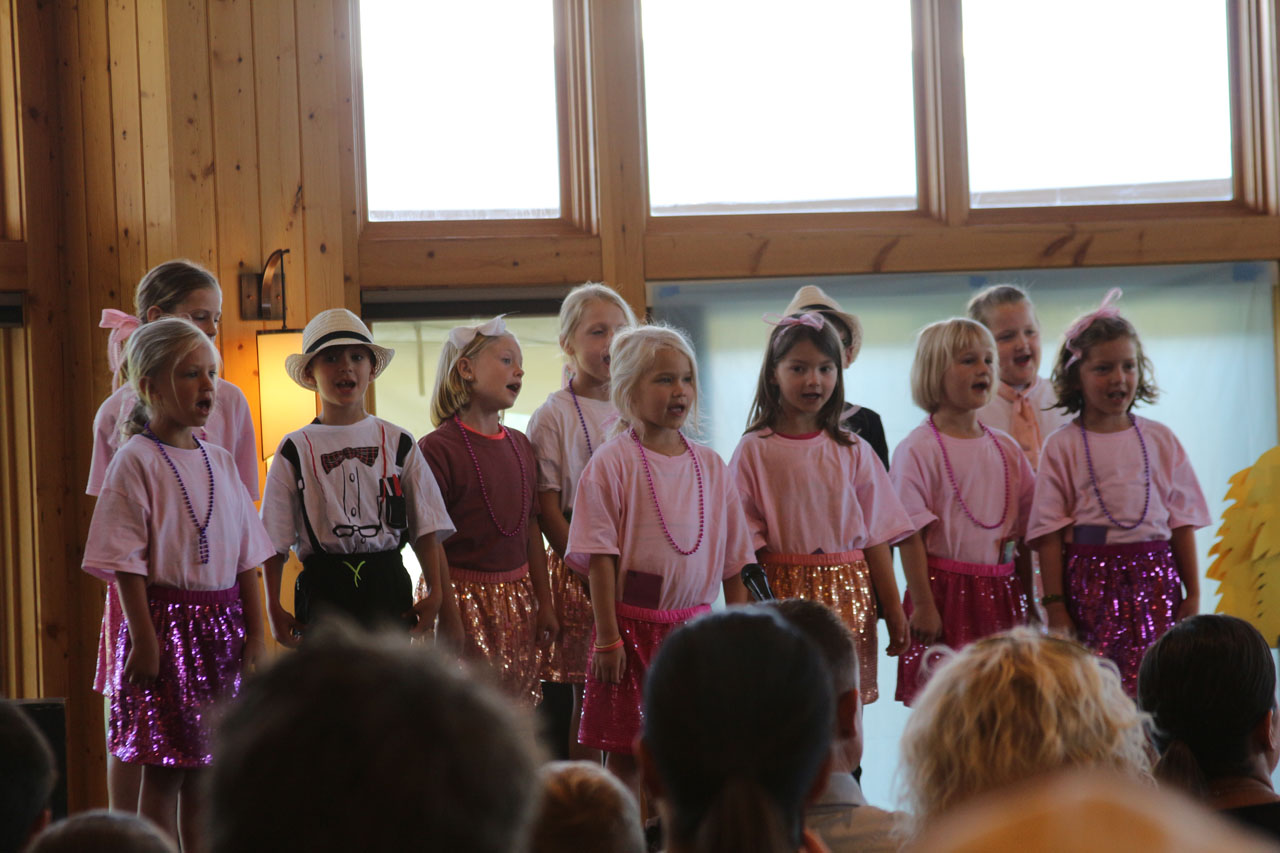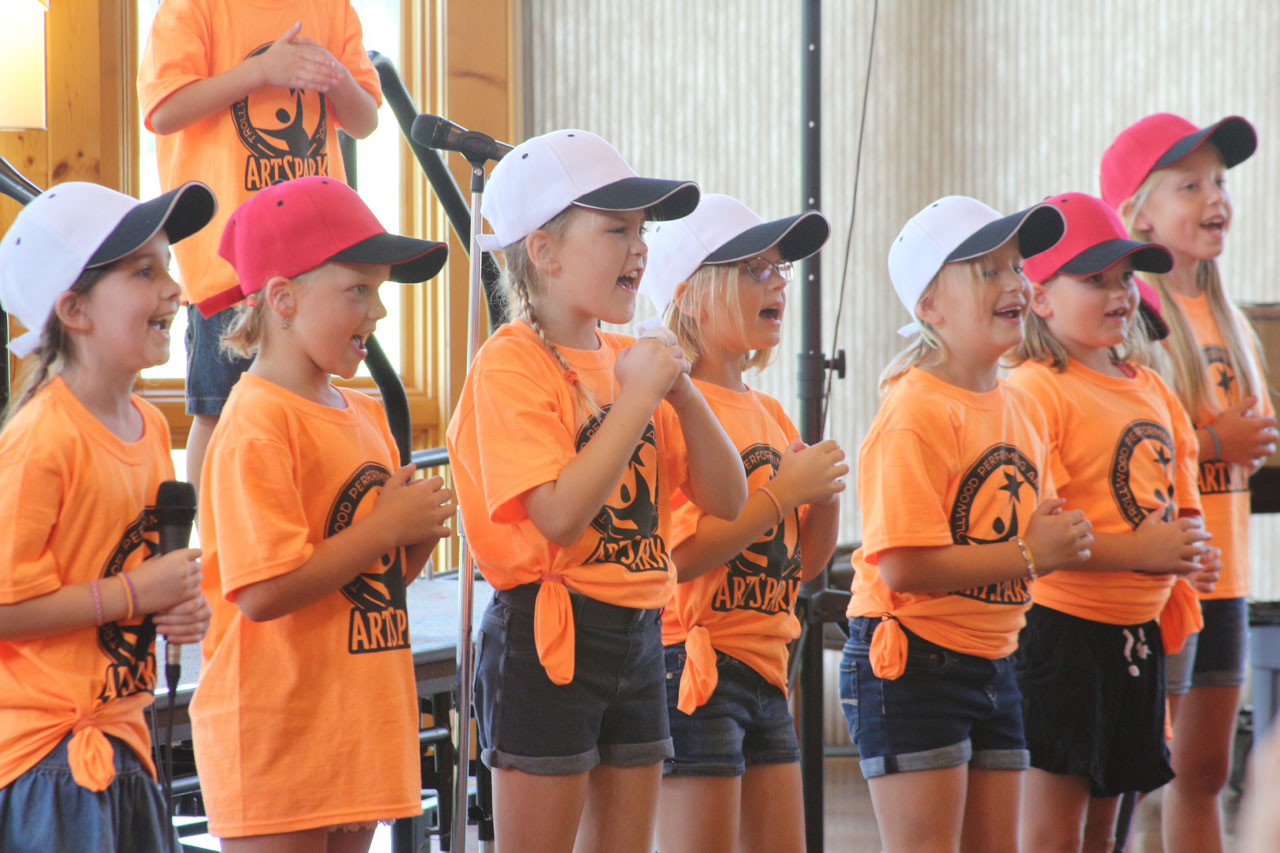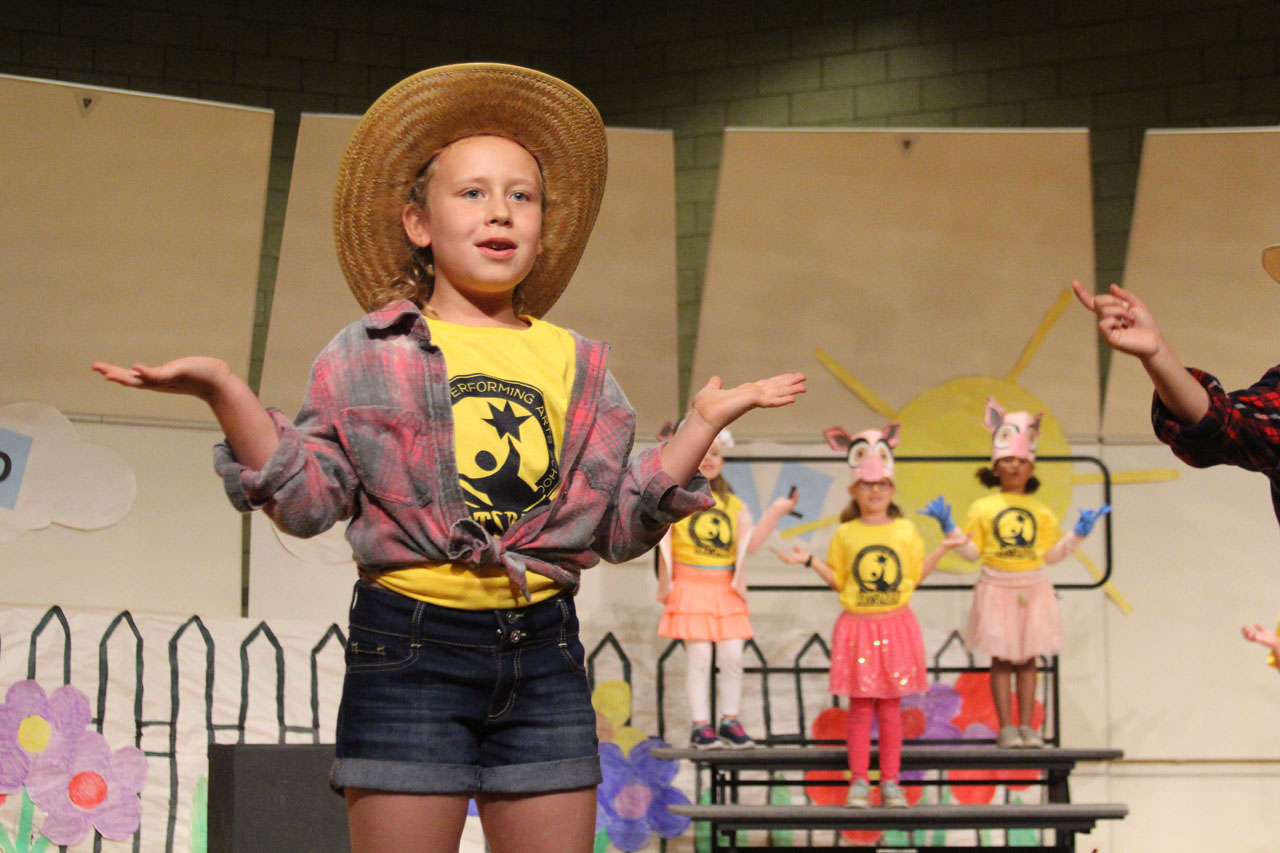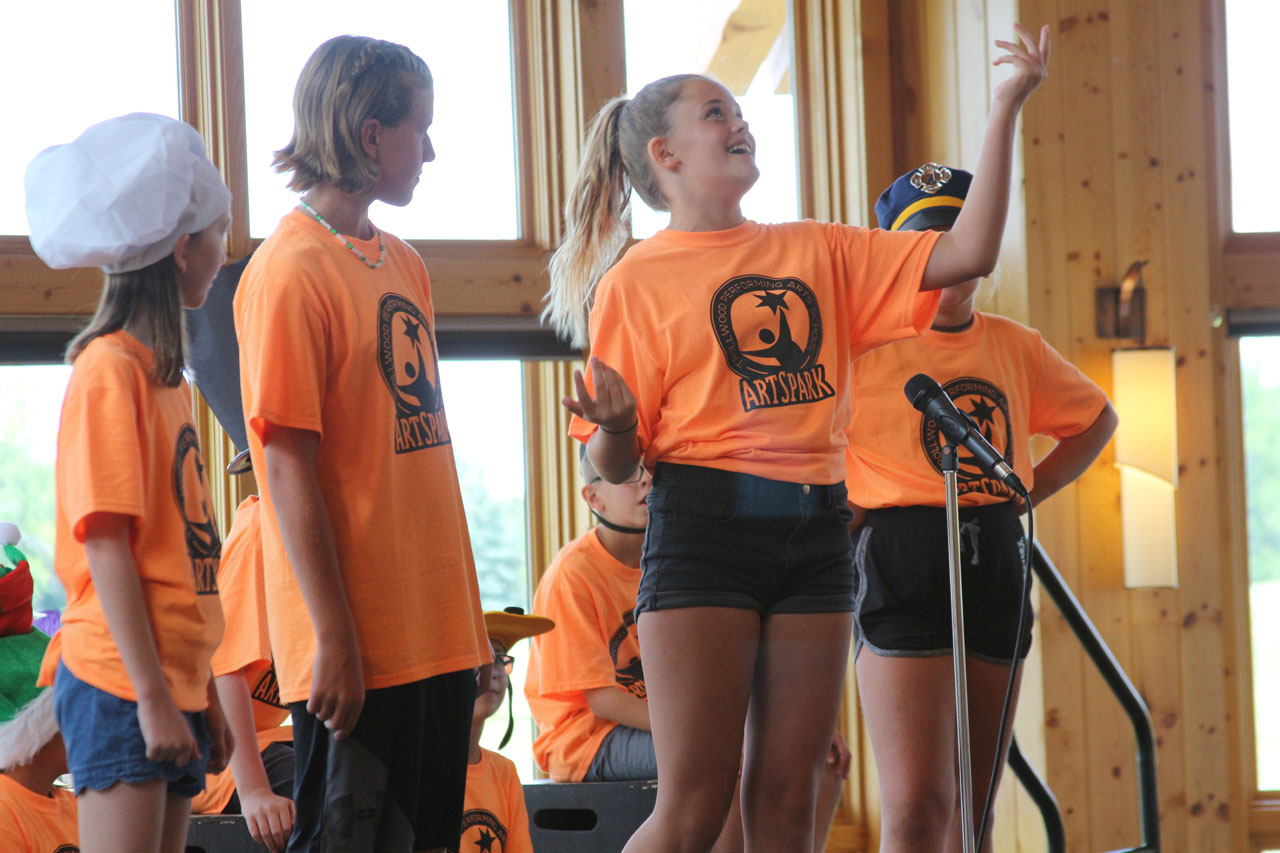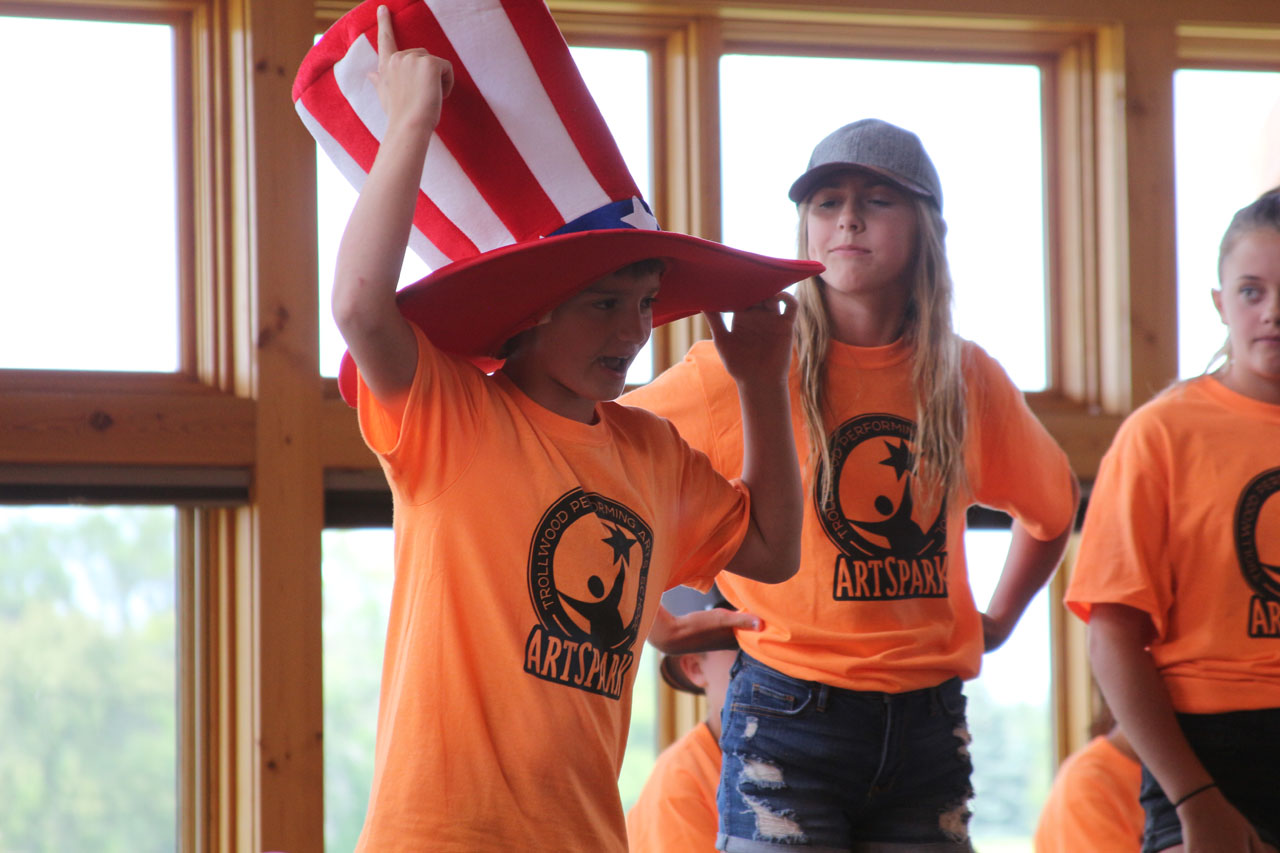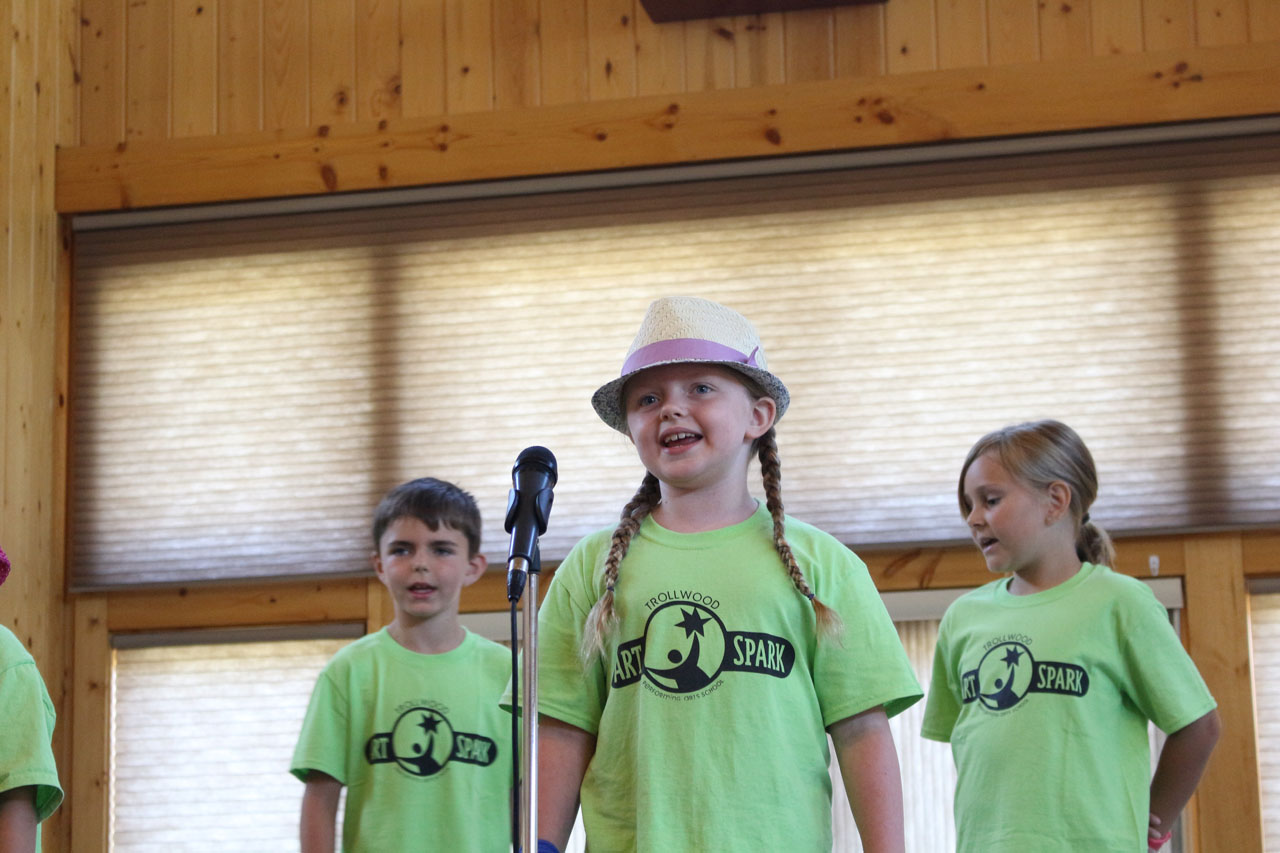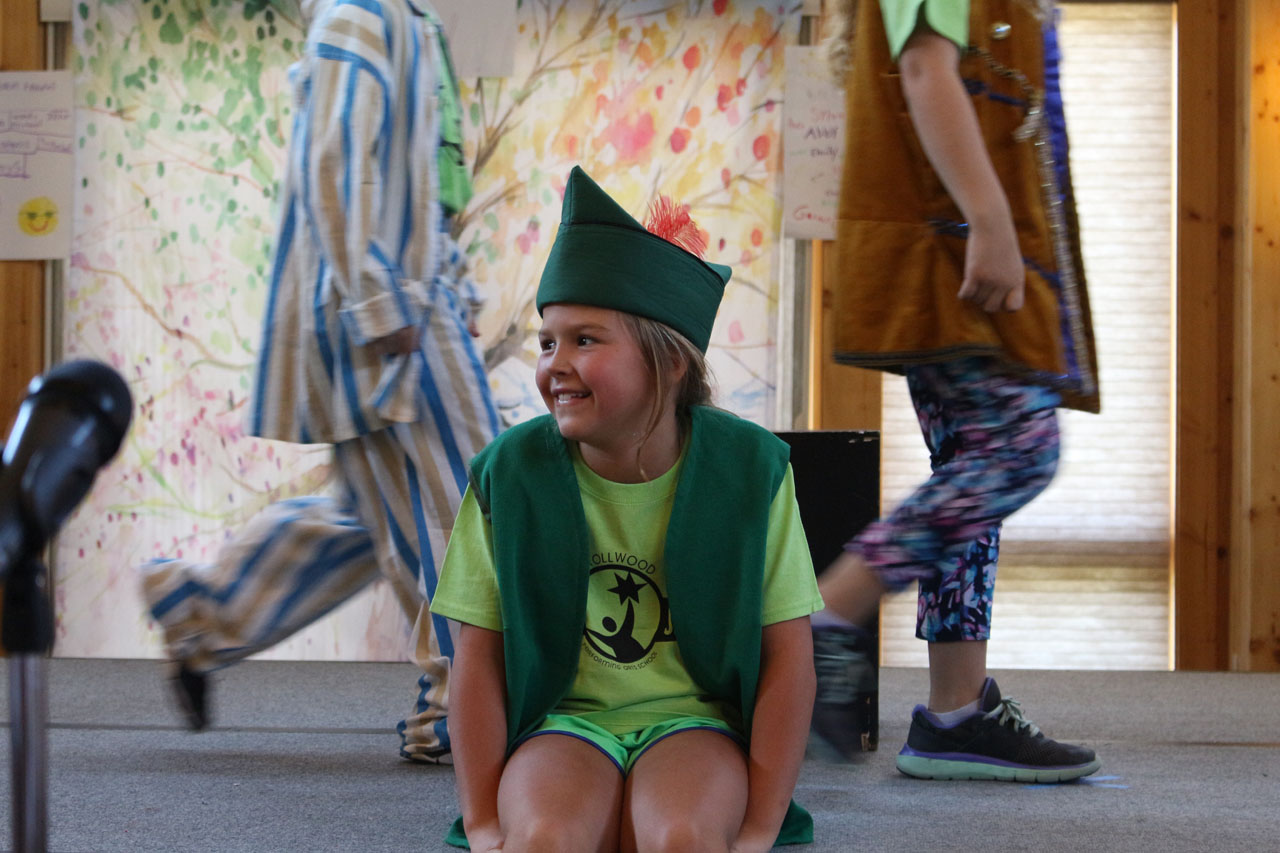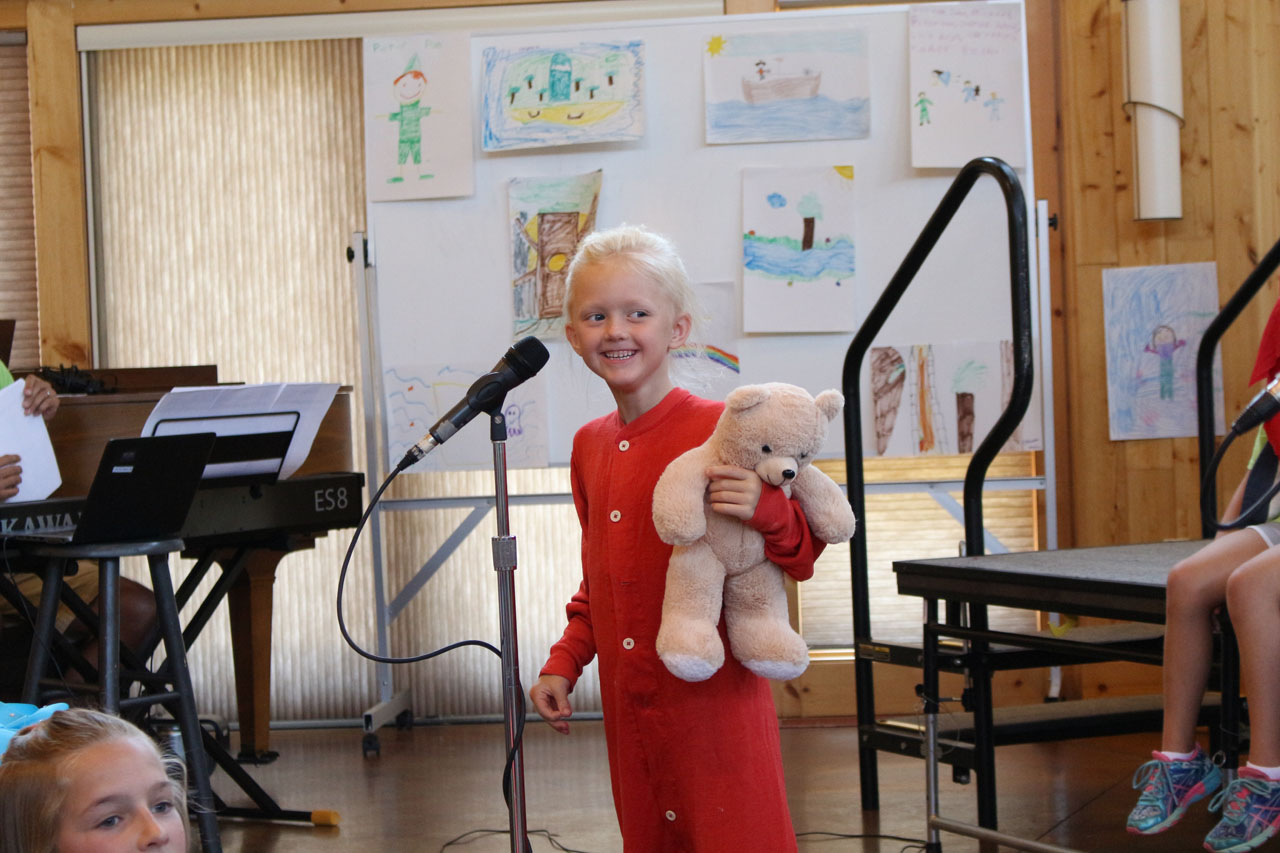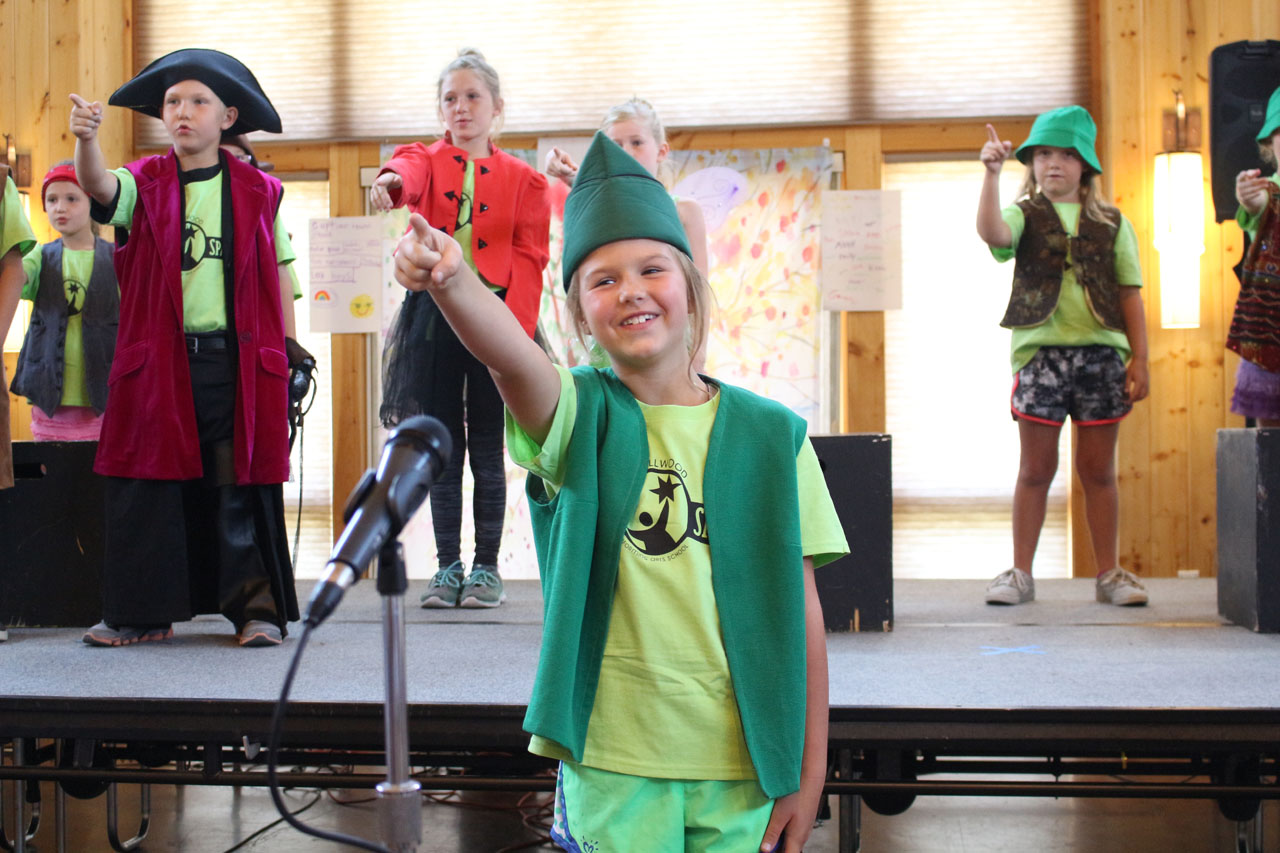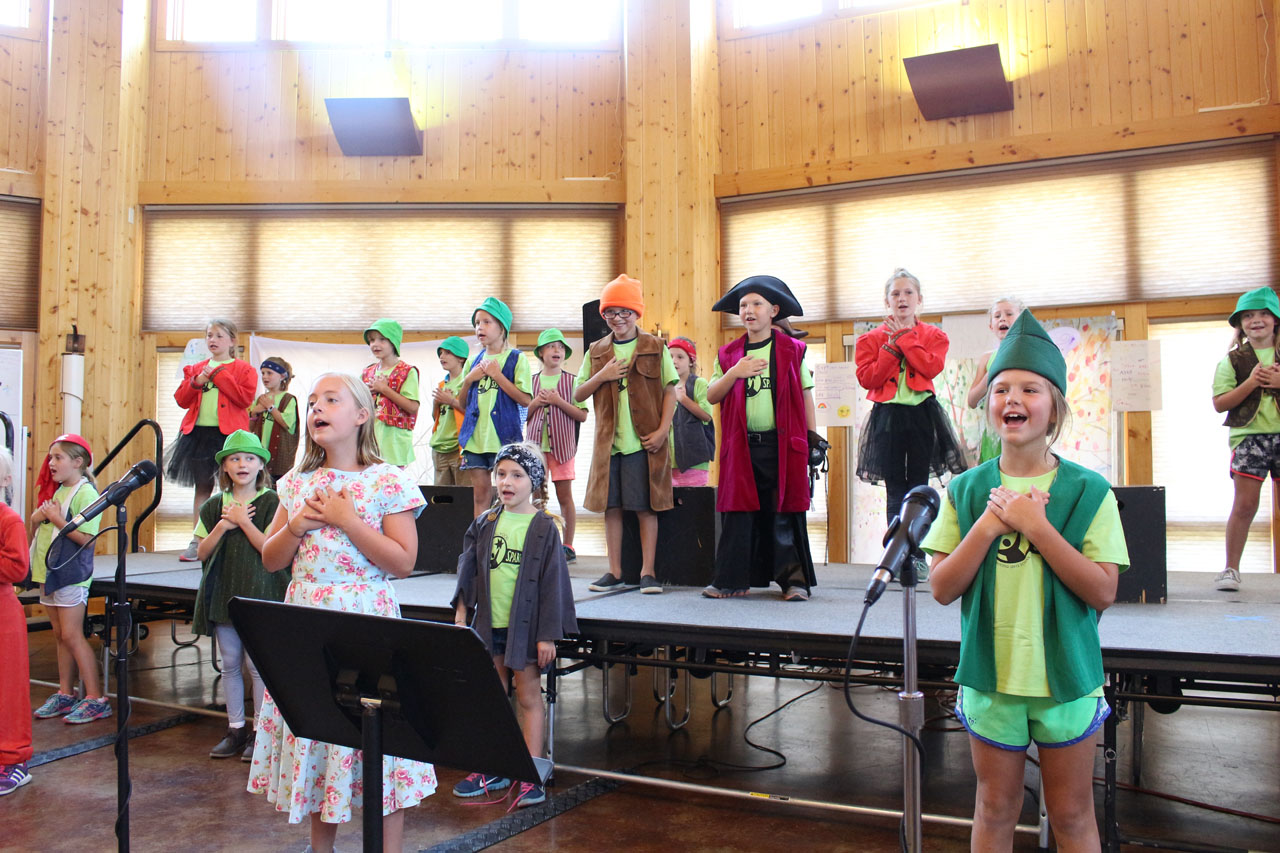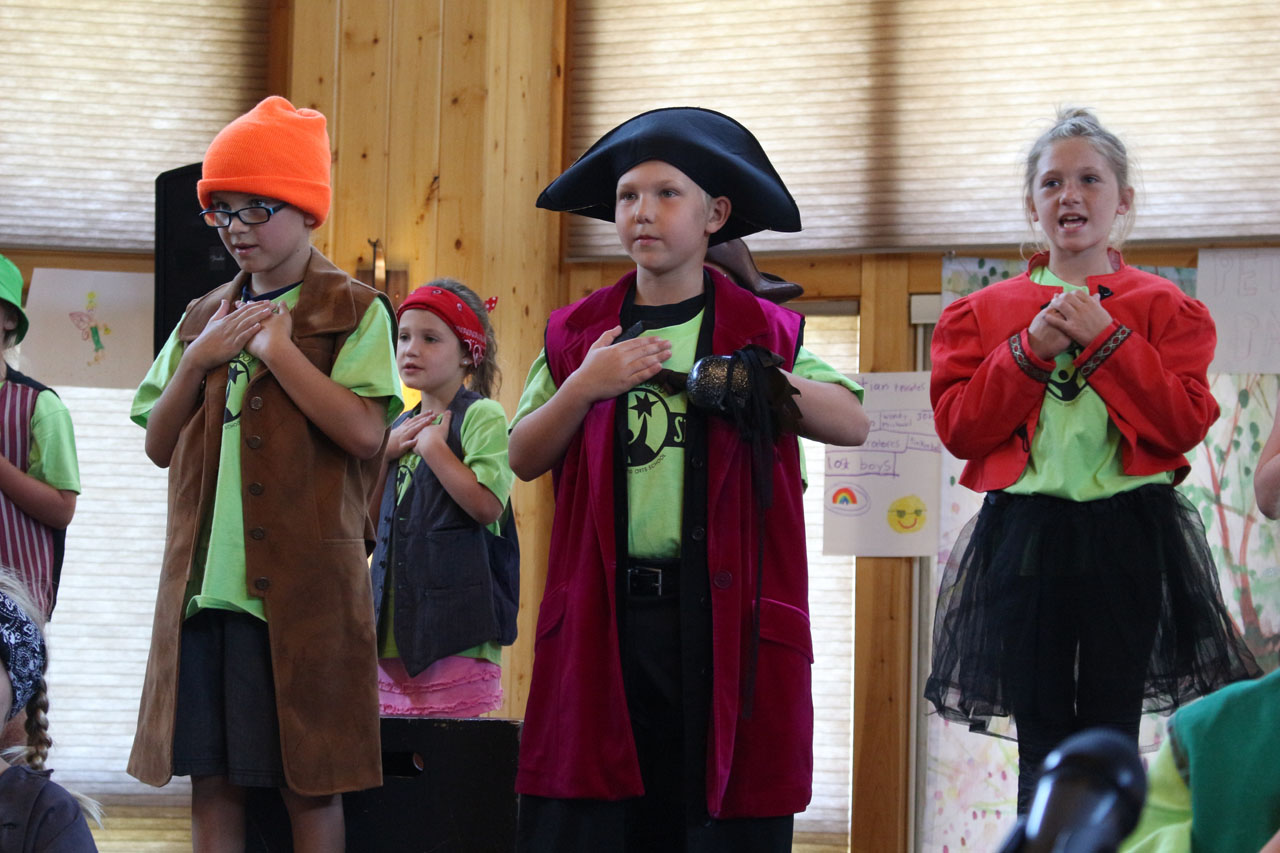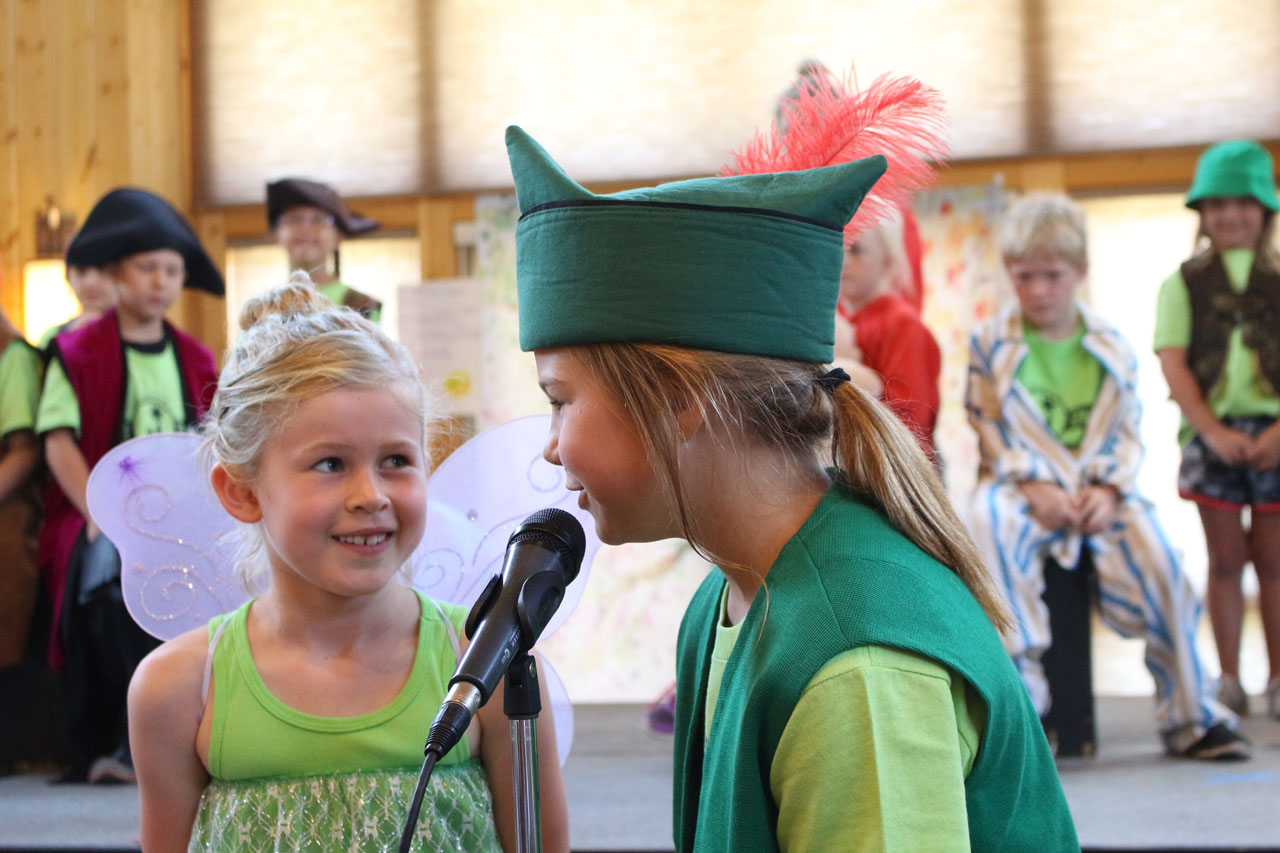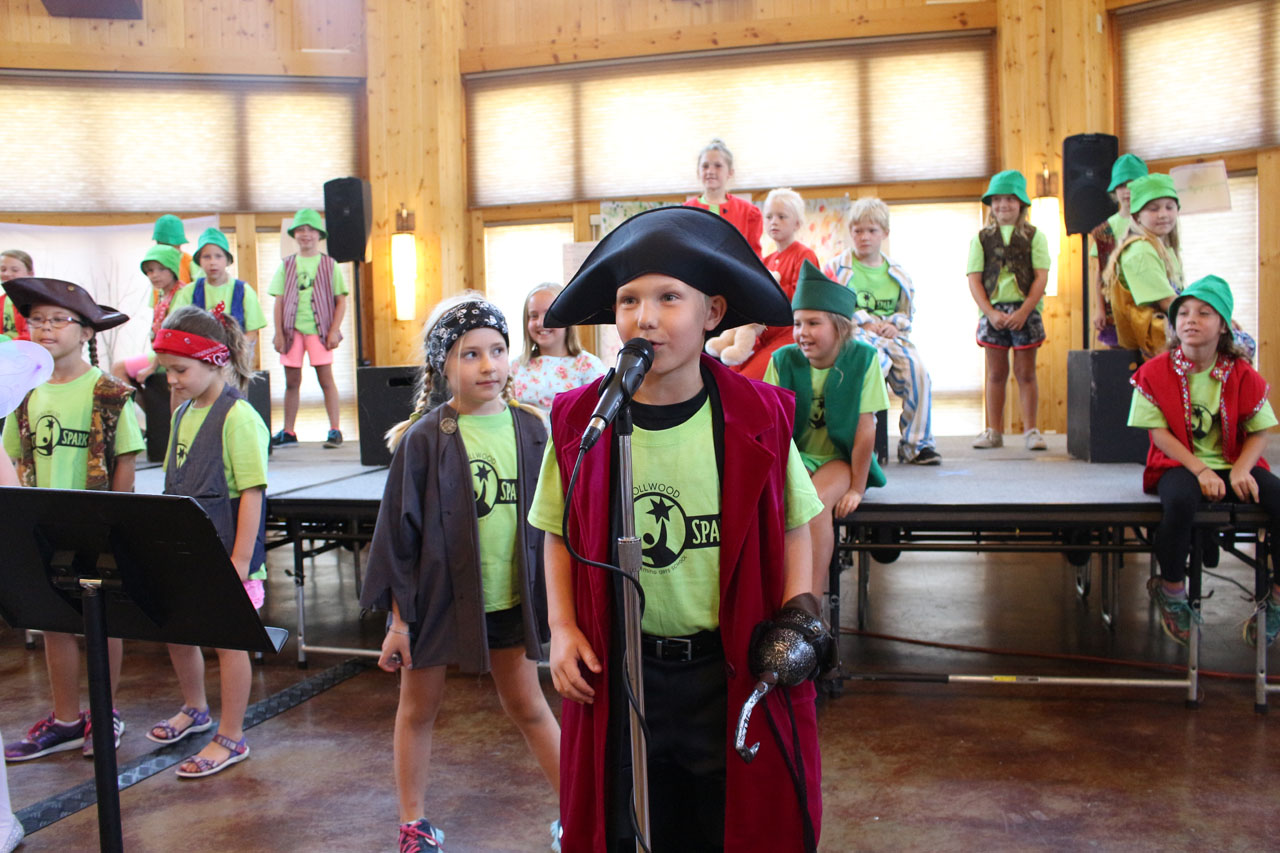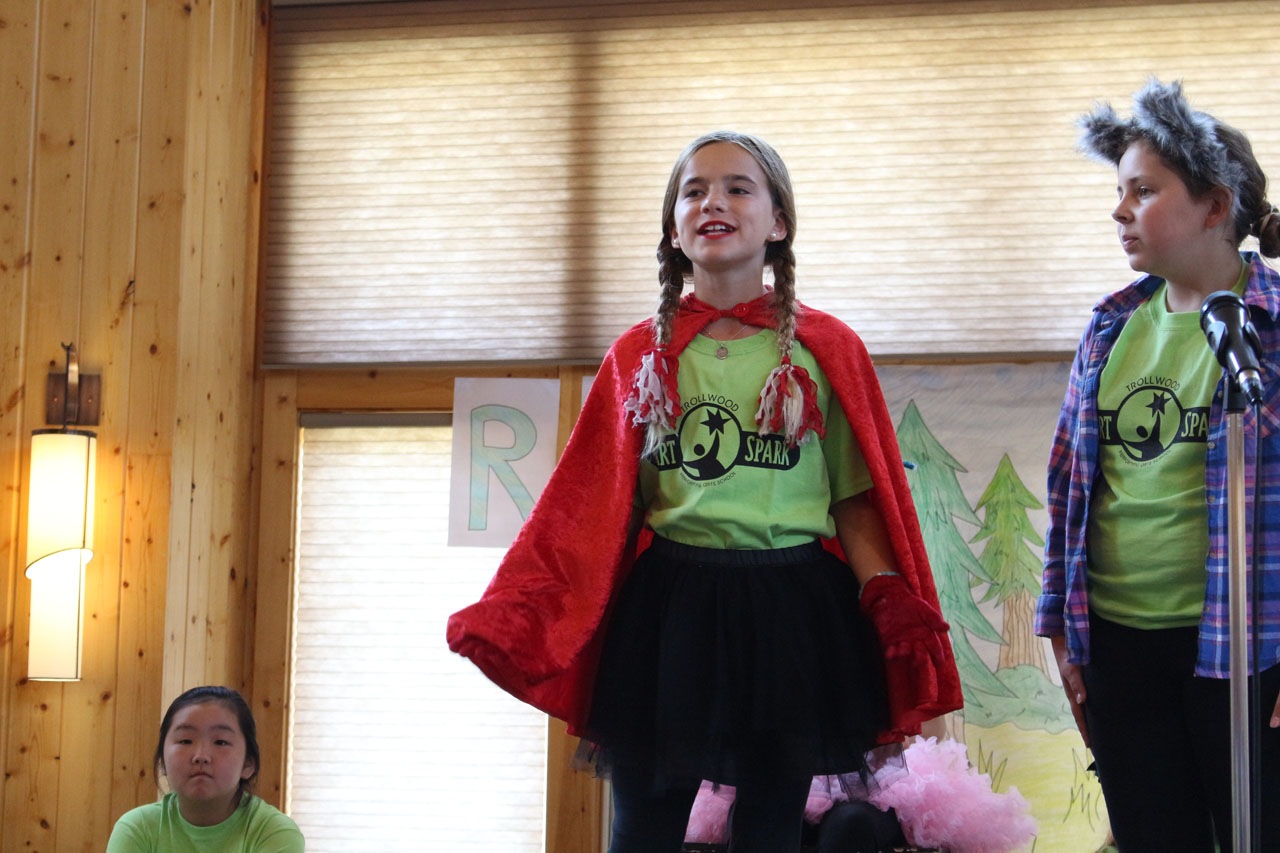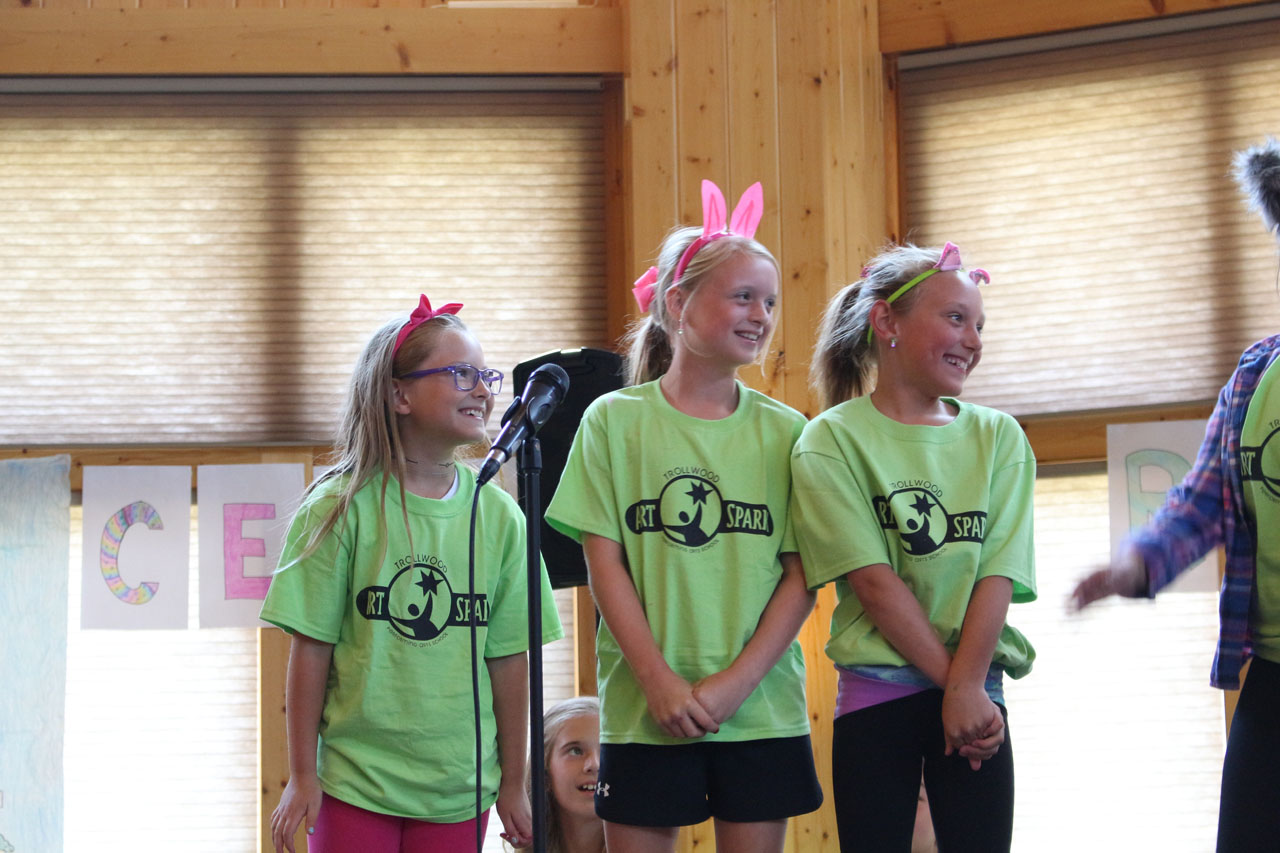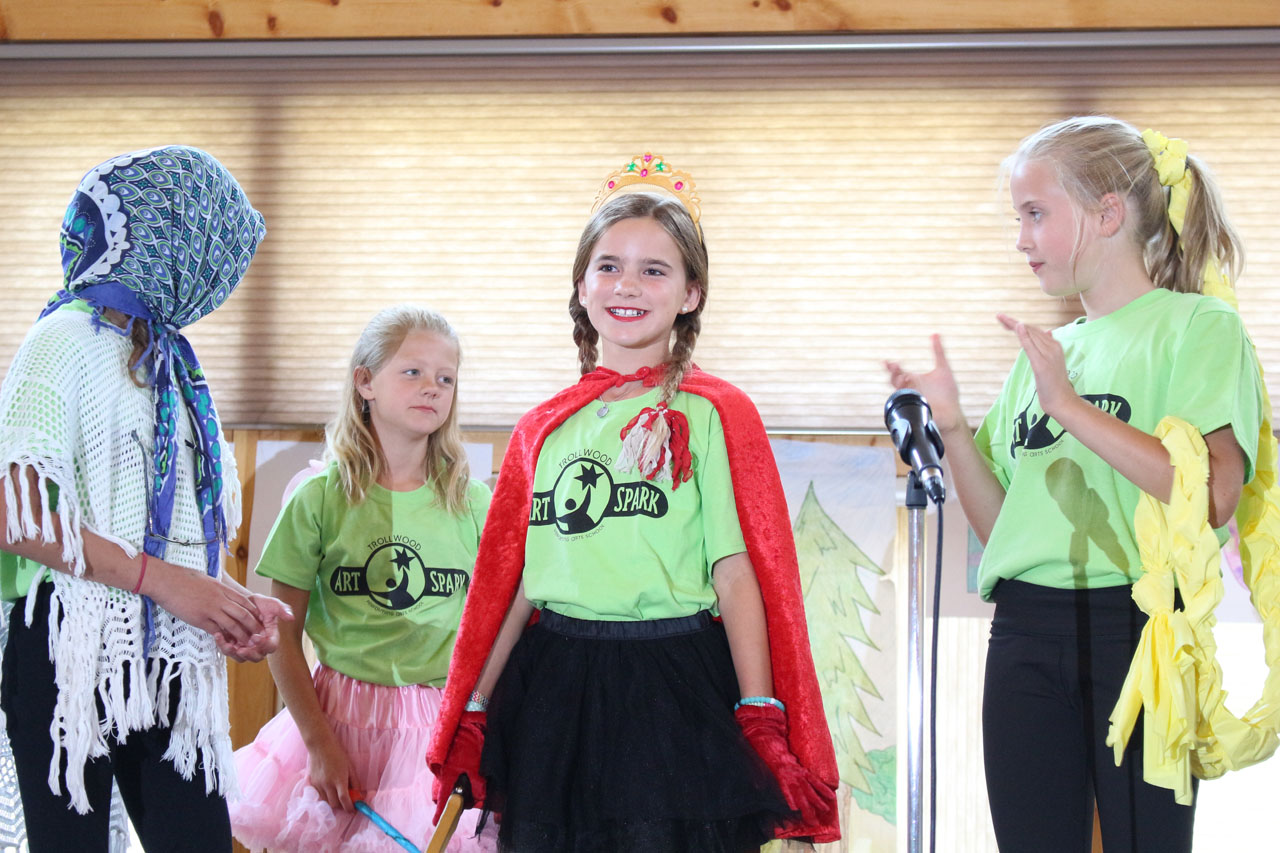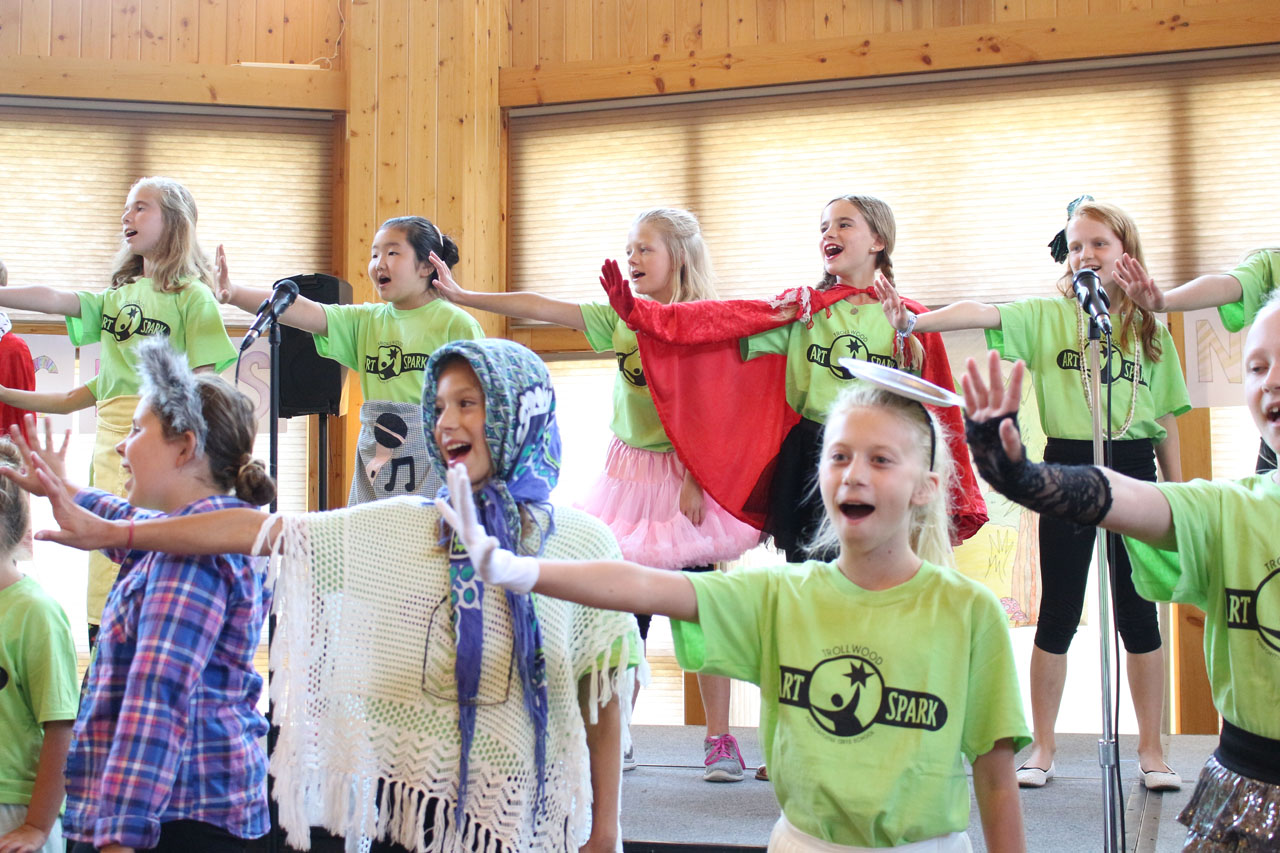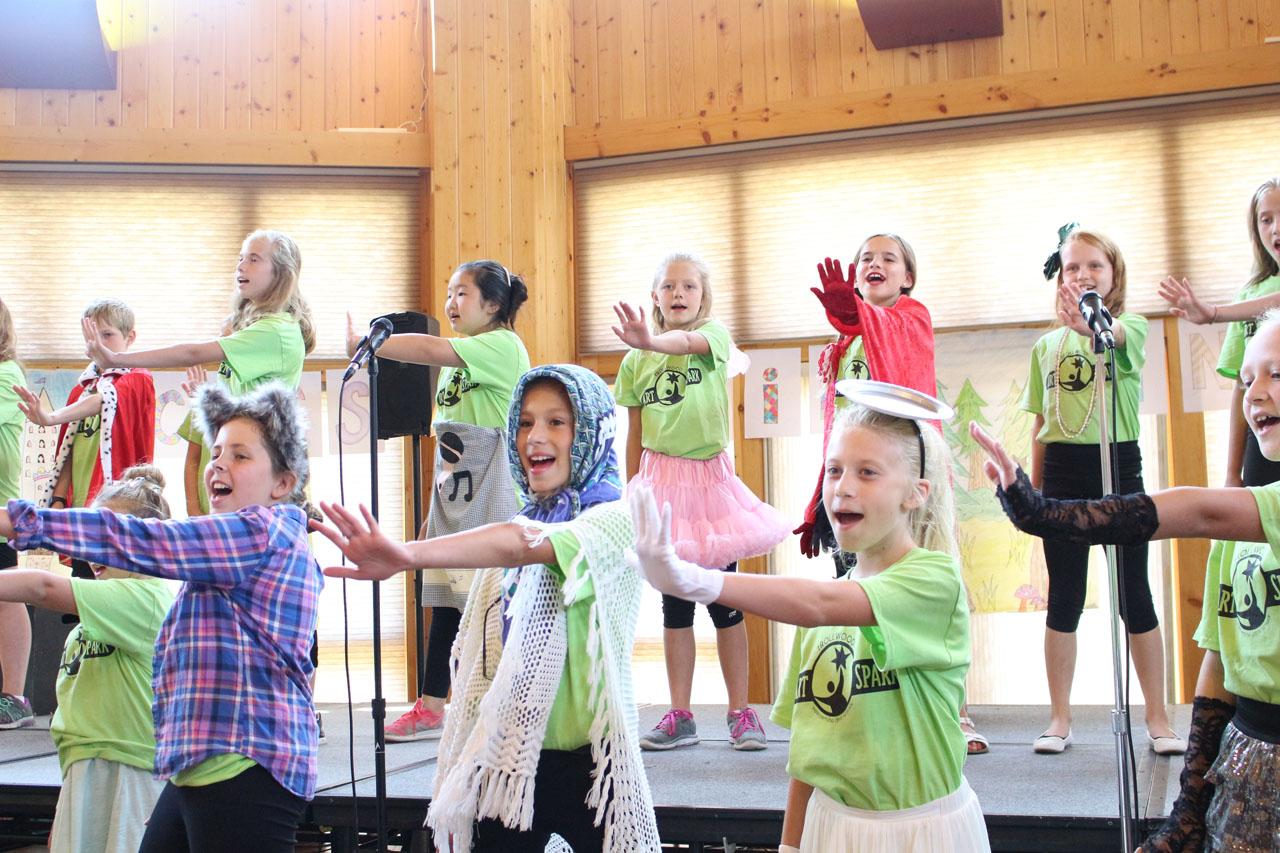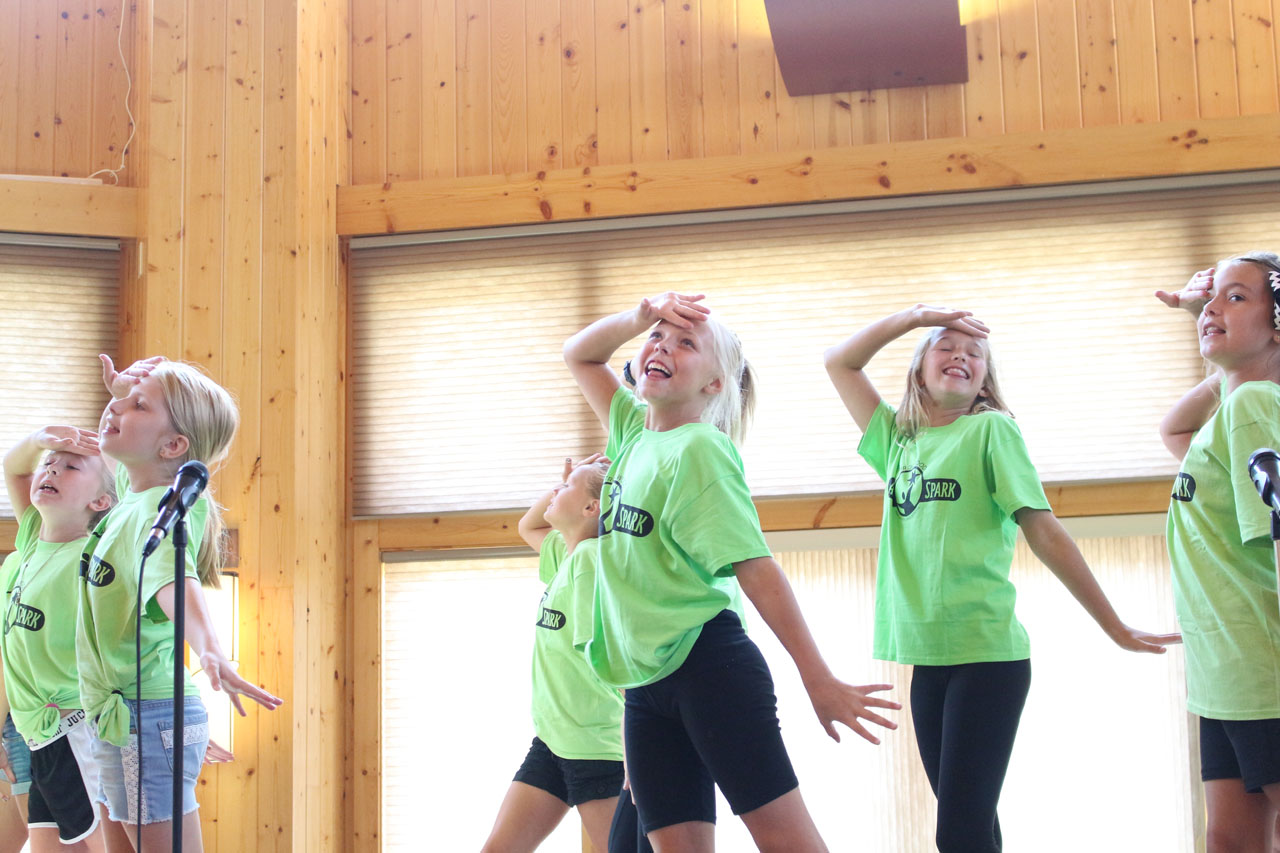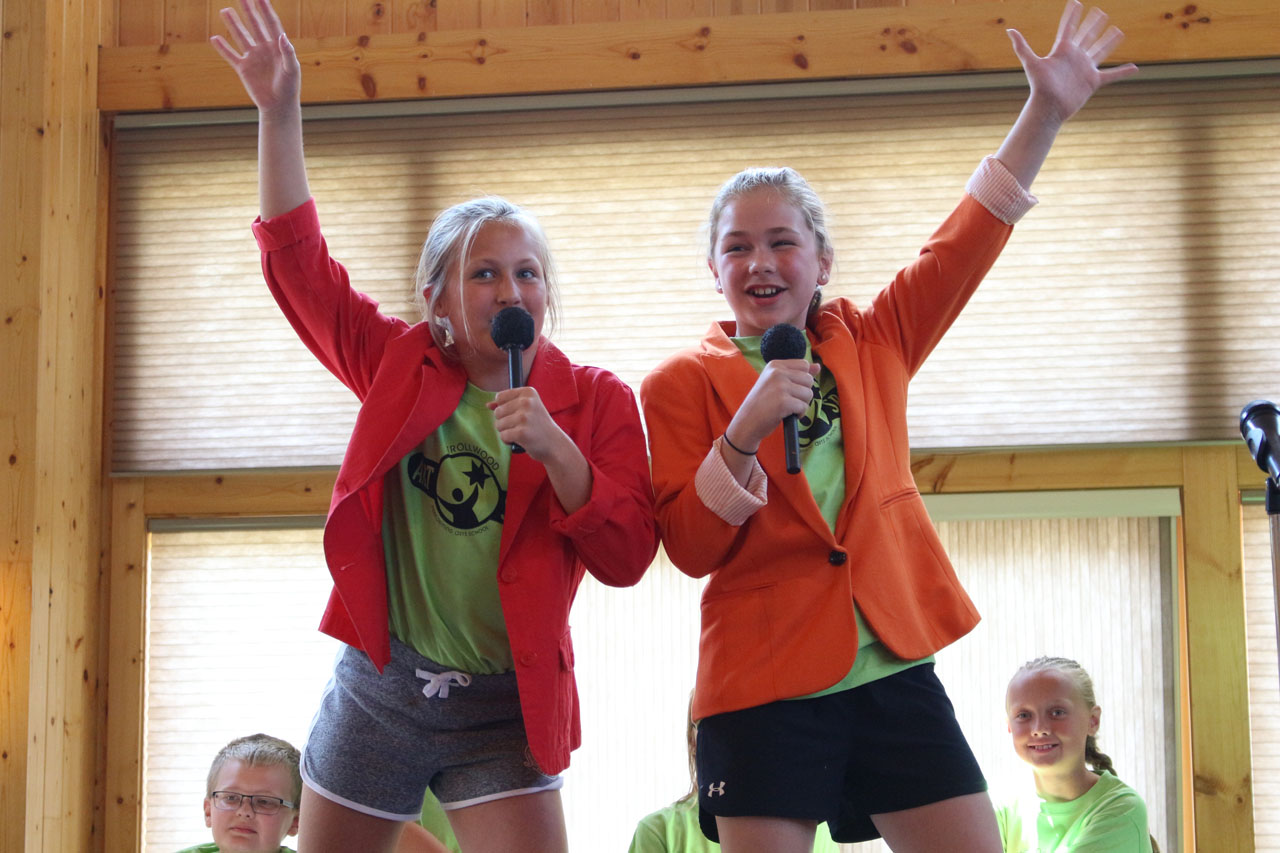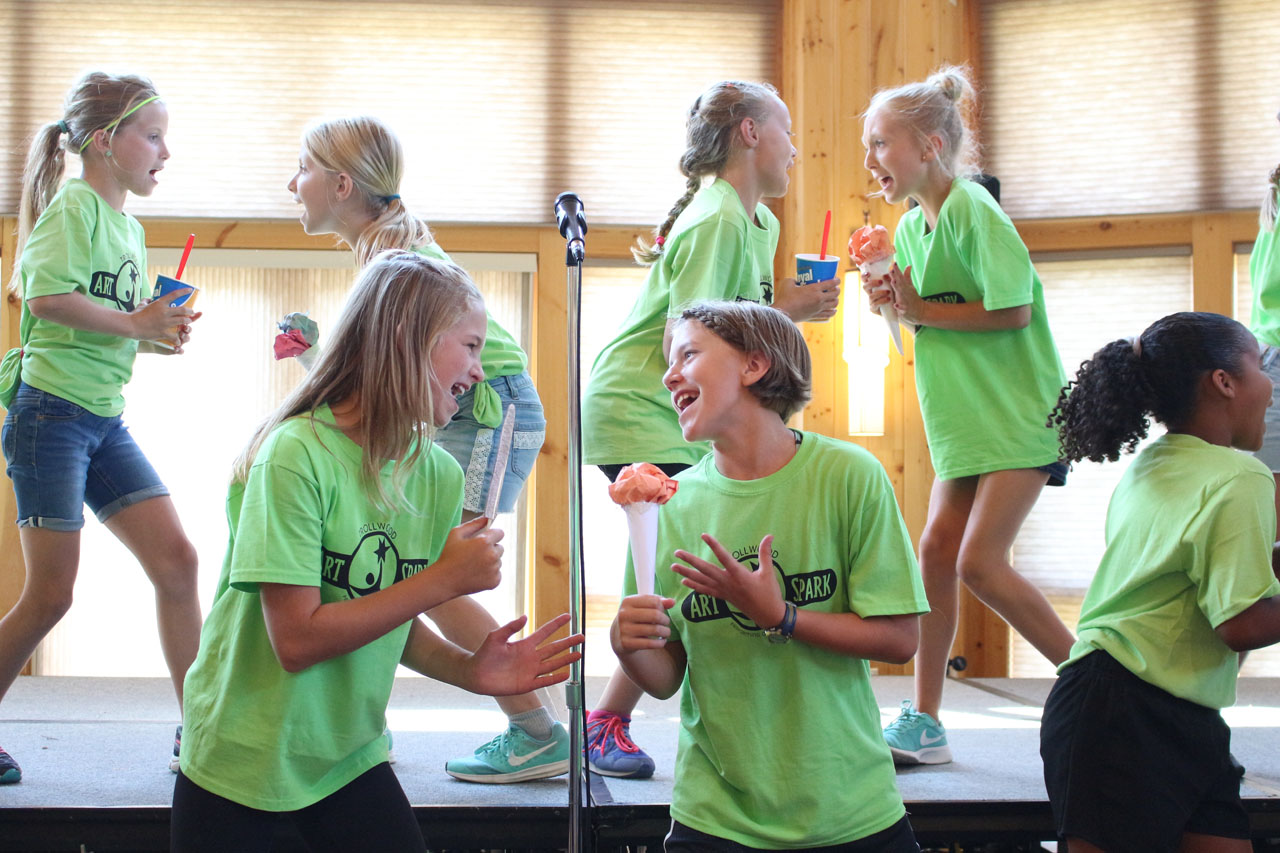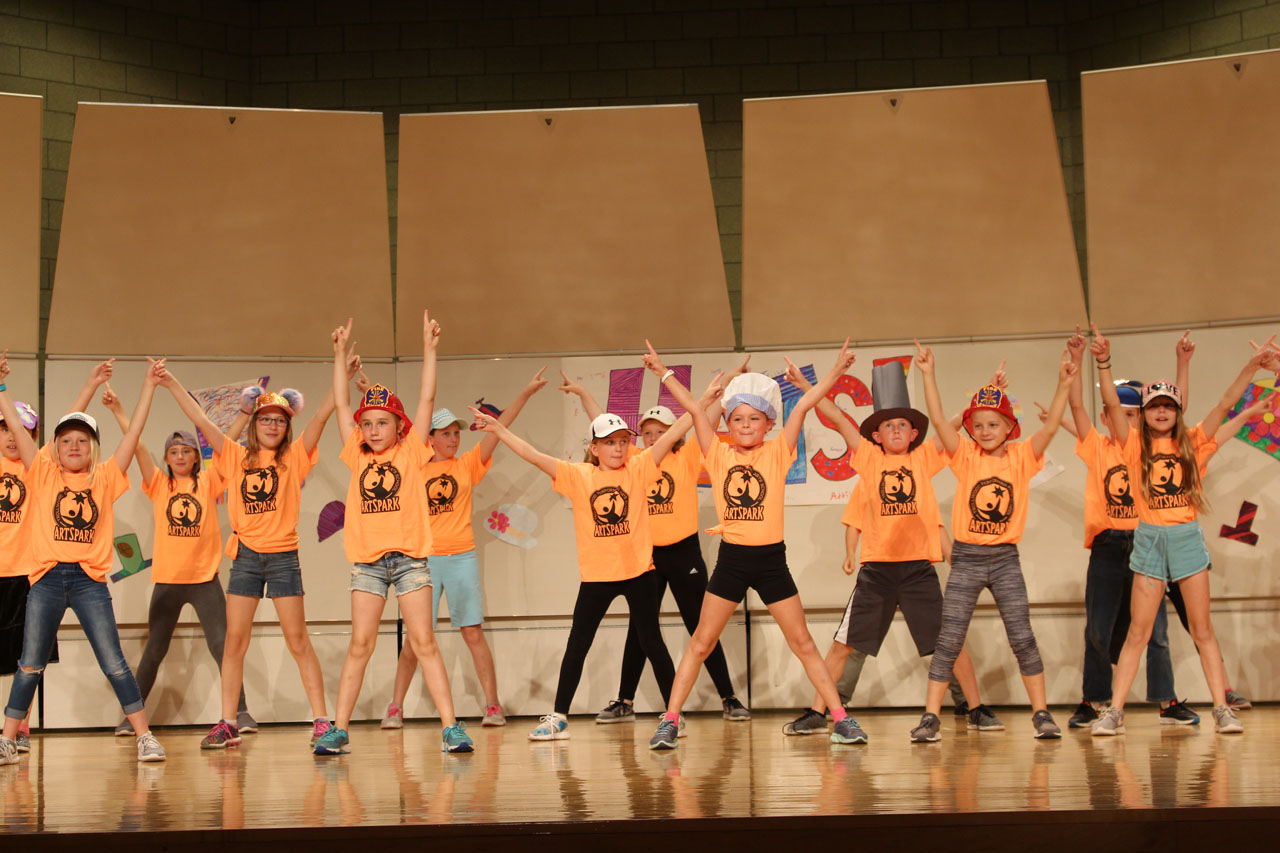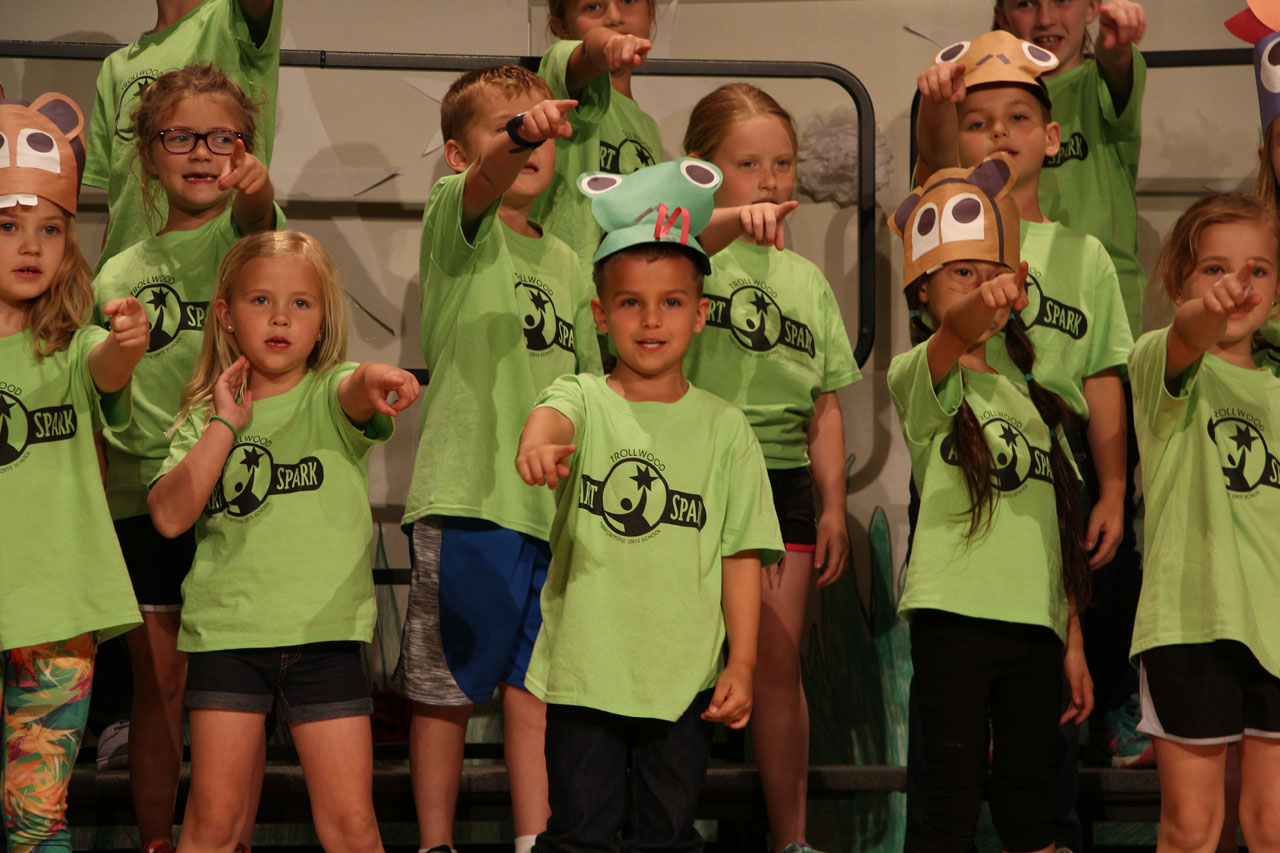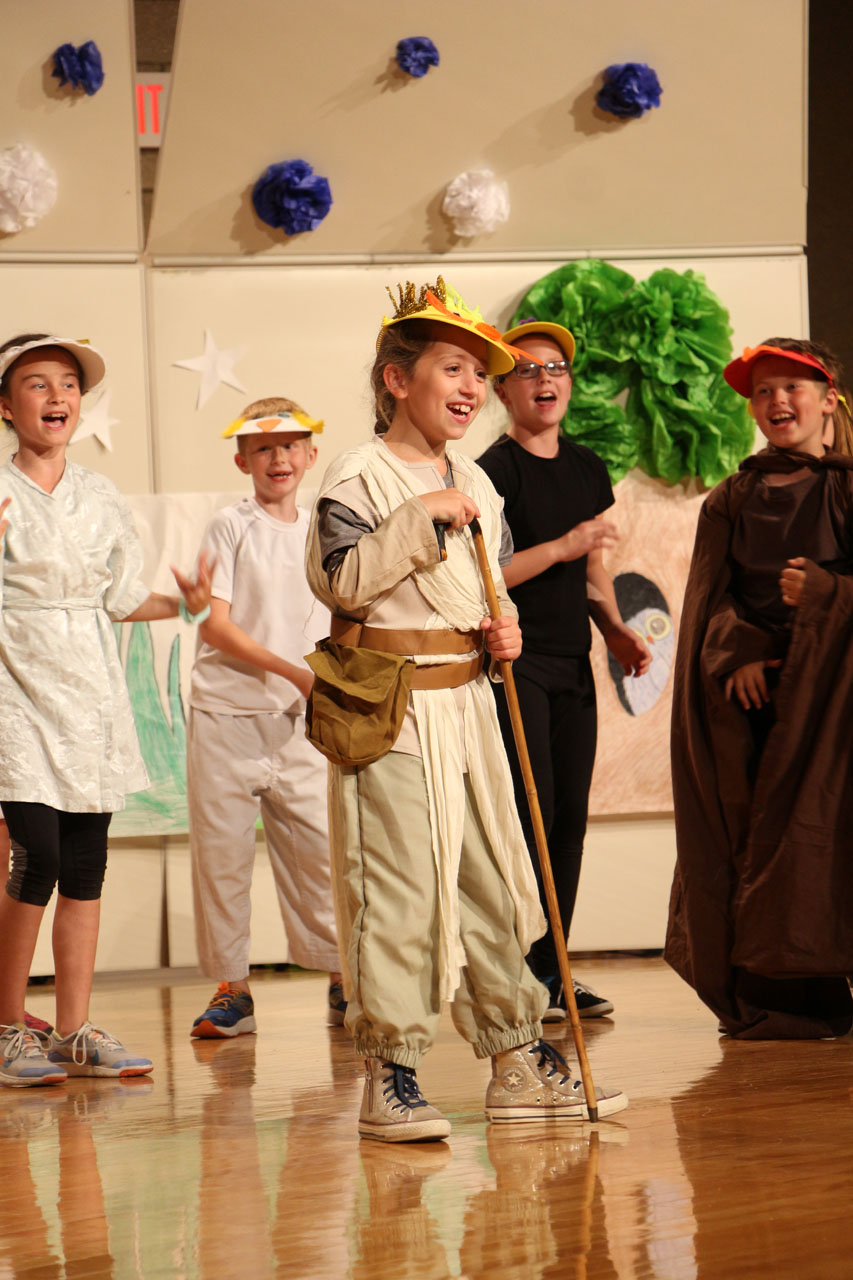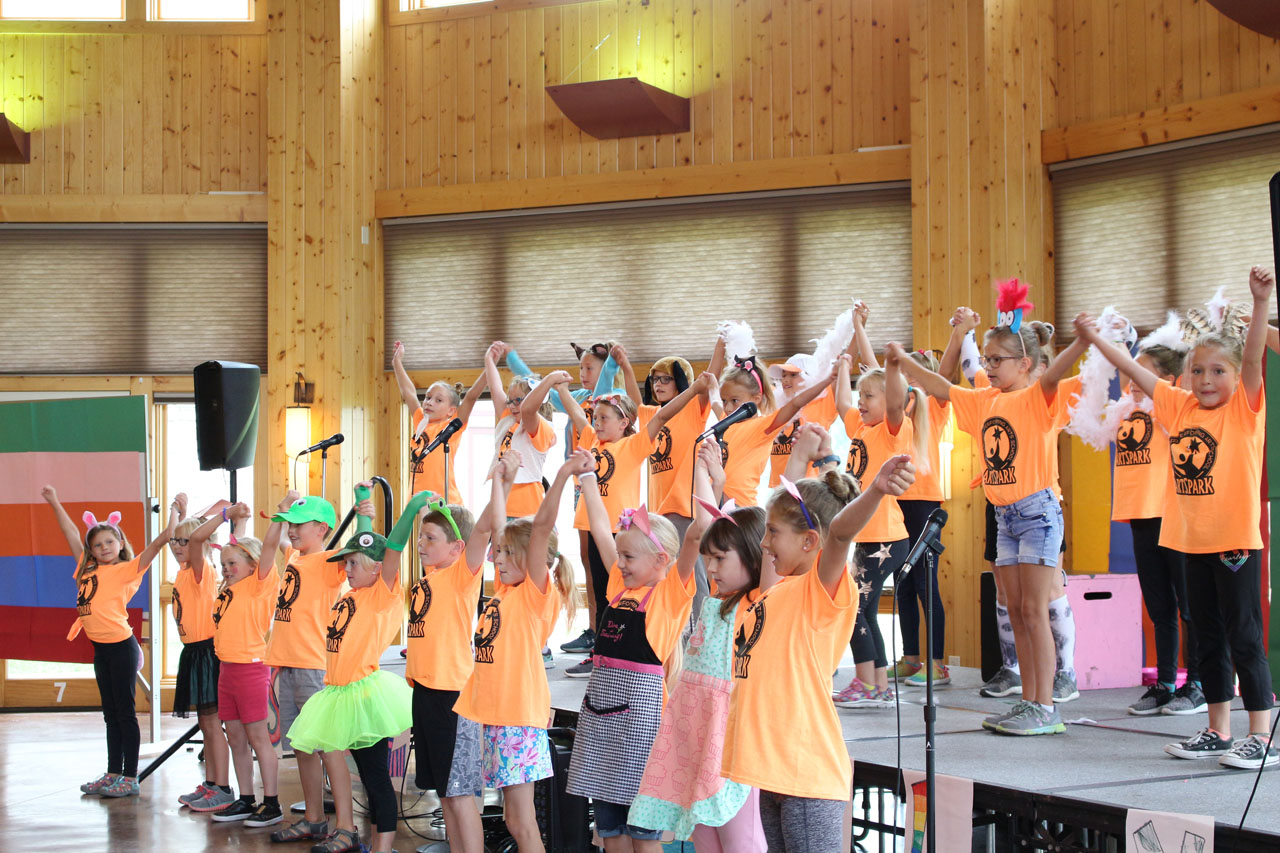ArtSpark will build confidence, ignite creativity,
& get your child fired up about the Arts!

ArtSpark provides children Grades K-4 (all grades refer to 2023-2024 school year) with an age-appropriate opportunity to explore the performing arts, guided by experienced music and theatre teaching artists.
Each day of the weekly ArtSpark sessions students will participate in:
- Theatre games
- Singing
- Acting
- Storytelling
- Movement & More!
All activities are centered around imaginative, fun themes that your student will love! Best of all, as a result of their performing arts training, kids become more confident, creative, and better communicators. Each session will culminate in a showcase of the students’ work, demonstrating what they’ve learned and created in ArtSpark.
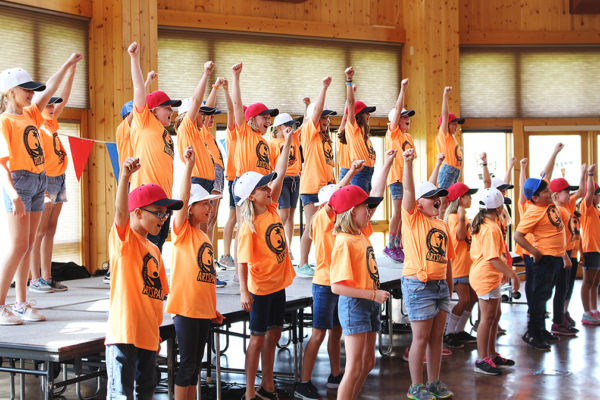
Grades: K-2 & 3-4
(all grades refer to 2023-2024 school year)
Time: 8:30 am–4:30 pm, Monday–Friday for each session. Friday end time may vary based on grade and time of showcase.
Lunch: Students are responsible for bringing their own lunch, snack, and beverages.
Fee: $275 per one week session
- Choose your week(s) and location(s) that works best for you!
- Different themes each week so your child can take multiple weeks!
- Fee includes team-taught instruction, class supplies, and program t-shirt they can wear with pride and take home! We offer a different color each year so they can build their collection!
2024 June ArtSpark Sessions
GRADES: K-2 (all grades refer to the 2023-2024 school year)
June 2024 dates
June 10-14 Ben Franklin Middle School, 1420 8th St N, Fargo, ND – Session is closed!
June 17-21 Carl Ben Eielson Middle School, 1601 13th Ave S, Fargo, ND – Session is closed!
GRADES: 3-4 (all grades refer to the 2023-2024 school year)
June 2024 dates
June 10-14 Ben Franklin Middle School, 1420 8th St N, Fargo, ND
June 17-21 Carl Ben Eielson Middle School, 1601 13th Ave S, Fargo, ND – Session is closed!
Registration Deadline: May 31 for ArtSpark June sessions. Registration remains open after this deadline. However, a $50 late fee will be assessed.
Sign up with a friend. We look forward to seeing you there!
2024 July ArtSpark Sessions
GRADES: K-2 (all grades refer to 2023-2024 school year)
July 2024 dates
July 8-12 at Trollwood Performing Arts School, 801 50th Ave S, Moorhead, MN – Session is filled
July 15-19 at Trollwood Performing Arts School, 801 50th Ave S, Moorhead, MN
July 22-26 at Trollwood Performing Arts School, 801 50th Ave S, Moorhead, MN
GRADES: 3-4 (all grades refer to 2023-2024 school year)
July 2024 dates
July 8-12 at Trollwood Performing Arts School, 801 50th Ave S, Moorhead, MN – Session is filled
July 15-19 at Trollwood Performing Arts School, 801 50th Ave S, Moorhead, MN
July 22-26 at Trollwood Performing Arts School, 801 50th Ave S, Moorhead, MN
Registration Deadline: June 30 for ArtSpark July sessions. Registration remains open after this deadline. However, a $50 late fee will be assessed.
Sign up with a friend. We look forward to seeing you there!
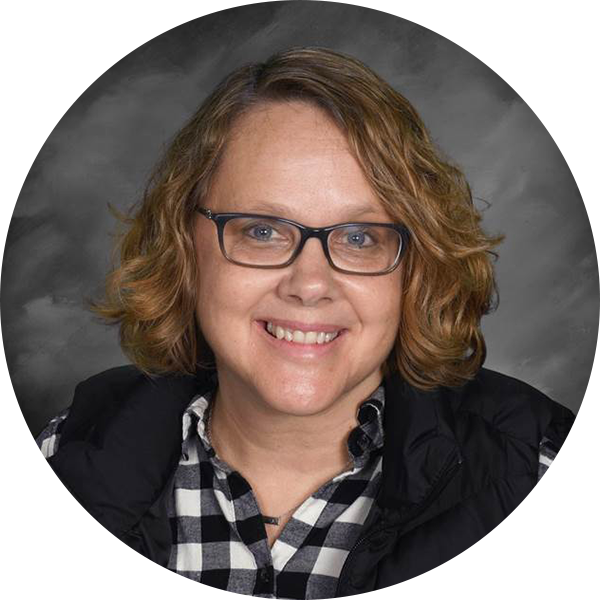
Joan Degerness
Joan Degerness is currently a Music Specialist in Moorhead, MN and teaches Grades K-4 at Dorothy Dodds Elementary. She has been a music educator for over thirty years. Joan was the Artistic Director of the Red River Boy Choir from 1997-2005. She has also been an active church musician and soloist for over twenty years, serving as a worship leader, accompanist and children’s choir director of Hope Lutheran Church in Fargo. Ms. Degerness attended Trollwood Performing Arts School through her junior high and high school years. Her “claim to fame” was playing the part of Dorothy in The Wizard of Oz (1983). She has also served at Trollwood as an administrative assistant, Imagine Children’s Choir Director, Children’s Choir Director for Joseph and the Amazing Technicolor Dreamcoat (2008), and an ArtSpark Instructor since the program’s inception in 2004. Joan helped to start the Trollwood Children’s Theatre program in 2012 & has served as the program’s Artistic Director and Stage Director. She has also been the Director for the Totally Trollwood Musical for the past 10 years. Joan holds a Masters in Curriculum and Instruction degree from the University of St. Thomas in St. Paul, MN. She earned her Bachelor of Music degree in Public School Music (K-12) from Concordia College, Moorhead.
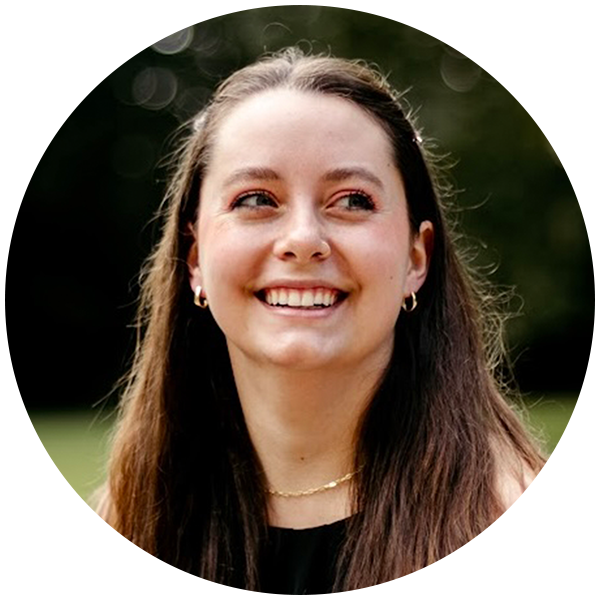
Hannah Mae Swanson
Hannah Mae Swanson is excited to be returning to Trollwood for her sixth year! Hannah has been working as a collaborative pianist, music director, and music instructor since 2015. She loves to music direct musical theatre and opera, teach piano lessons, accompany choirs and individual musicians, play organ, and write and cover jazz and funk tunes in her Minneapolis-based band. Hannah has her bachelor’s degree in Piano Performance from North Dakota State University and her master’s degree in Collaborative Piano Performance from the University of Northern Colorado. Hannah currently resides in Saint Paul, MN with her cat Cosmos. To learn more, explore Hannah’s website, hannahmaeswanson.com.
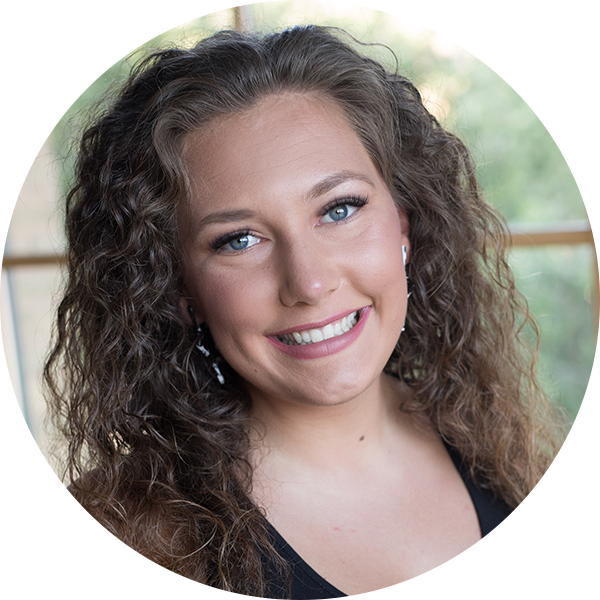
Mariah Schafer
Hey guys, I am Miss Mariah! This will be my third summer at Trollwood and I am so excited to spend it with you. I will be teaching TTA Dance for Stage, Tap, and Hip Hop as well as TA Dance for Stage. I will also be teaching two weeks of ArtSpark in July (July 8-12 & July 15-19). Outside of Trollwood, I work at L.E Berger Elementary, Red River Dance & Performing Company as a competitive instructor, and Fargo South High School as their musical choreographer. I enjoy taking my cat Baymax on walks, going to the lake with my parents and two younger sisters, reading fantasy books, puzzles and coloring. Trollwood has made my summers more fun, given me one of my best friends Hannah, and opened the door for so many opportunities that I am forever grateful for. I hope you immerse yourself in all that Trollwood has to offer this summer. I can’t wait to meet you 😊
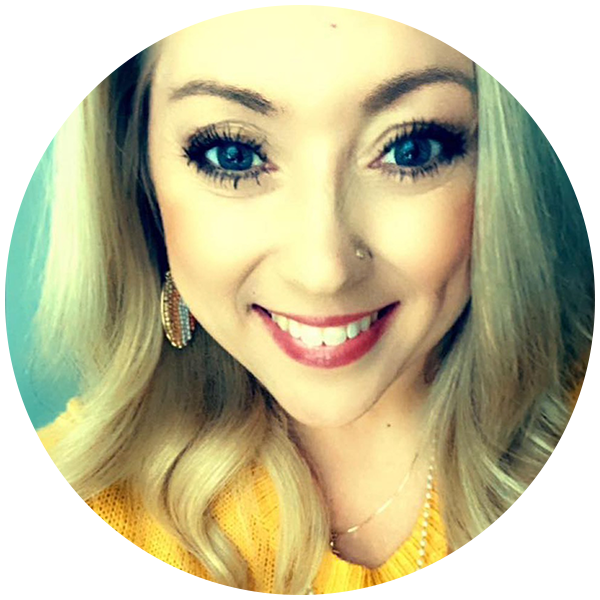
Ansley Cameron
Miss Ansley Cameron is a Music Director for the Trollwood Performing Art School’s ArtSpark Program and has been serving in this role since 2009. Miss Cameron has worked for the West Fargo Public Schools as an Elementary Music Teacher since 2010. Miss Cameron recently accepted a new teaching position as a Middle School Choir Director in the Saint Michael-Albertville School District starting this fall. Miss Cameron plans to return to the FM area every summer to continue in her position as a Music Director for the ArtSpark program for as long as she is able. Miss Cameron enjoys teaching at Trollwood and loves spending her summers with Trollwood’s amazing ArtSpark students!
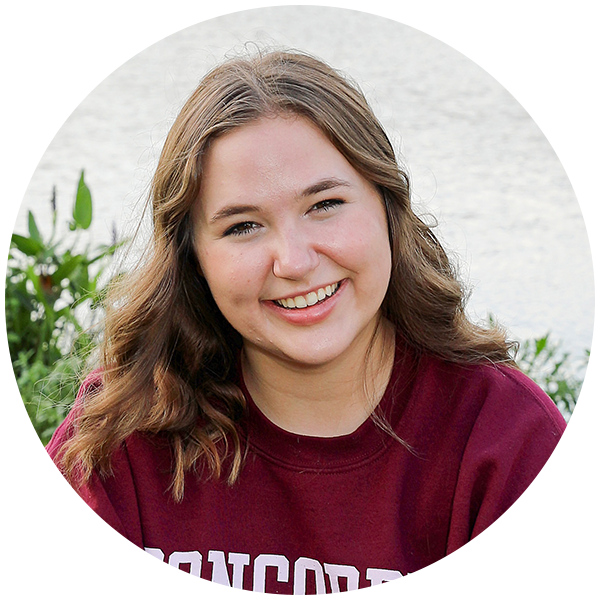
Madi Goerig
Madi Goerig is a fourth-year student at Concordia College-Moorhead studying Vocal Music Education. As a student at Concordia, Madi sings as a soprano in Chapel Choir and recently performed in Concordia Opera Studio’s production of Dan Shore’s An Embarrassing Position. She has performed in high school and community theatre productions including All Shook Up! and Matilda. Madi is excited to return for her second summer at Trollwood teaching TTA vocal classes and ArtSpark!

Kasen Sanders
Kasen Sanders has been involved with Trollwood since 2017. He started off doing Totally Trollwood Musicals and now is theatre mentoring for ArtSpark programs! He went to school at Fargo North High School performing in a variety of shows including Newsies, Heathers, and Tuck Everlasting.
While working on his studies in Digital Marketing at Minnesota State University Moorhead, he worked in an Entertainment/Performance themed location in Orlando, Florida among professional performers from across the world. Outside of professional work, Kasen enjoys going to theme parks across the country, traveling, writing music, going to the lake, and hosting and planning VIP events.
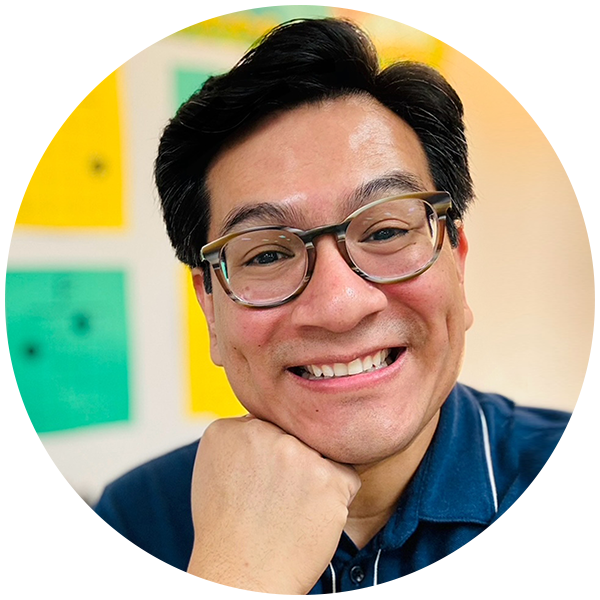
Kyle Berkley
Kyle Berkley is a dedicated music educator with over a decade of experience. Starting as an adjunct voice and music instructor at Ohio University in 2014, he now teaches K-5 general music at Deer Creek Elementary in West Fargo Public Schools. Kyle has made waves as an esteemed opera performer and recitalist, captivating audiences with his resonant voice. He is known for his collaboration with composer Gwyneth Walker on the song cycle “I’ve Known Rivers.” Kyle holds a Bachelor of Music in Music Education from Kent State University and a Master of Music in Vocal Performance from The University of North Carolina Greensboro.
ARTSPARK (K-4)
ArtSpark introduces elementary students to the performing arts in three curricular areas: Vocal Music, Drama, and Dance. The applicable standards and benchmarks for this program are listed below. Not all standards and benchmarks will be addressed in each one week session, but a significant number of them will be represented.
MUSIC
Standard 1: Singing
Students sing, alone and with others, a varied repertoire of music.
K-5.1.1. Sing independently on pitch and in rhythm.
K-5.1.2. Sing expressively.
K-5.1.3. Sing from memory a varied repertoire of songs representing genres and styles from diverse cultures.
K-5.1.4. Sing in parts.
K-5.1.5. Sing in groups.
Standard 2: Instrumental Performance
Students perform on instruments, alone and with others, a varied repertoire of music.
*This standard is not applicable in ArtSpark.
Standard 3: Improvisation
Students improvise melodies, variations, and accompaniments.
K-5.3.1. Students improvise simple melodies, rhythmic and melodic variations, and accompaniments.
Standard 4: Composition
Students compose and arrange music within specified guidelines.
*This standard is not applicable in ArtSpark.
Standard 5: Reading Music
Students read and notate music.
K-5.5.1. Read simple rhythms in basic meters.
K-5.5.2. Know how to use a system to read simple pitch notation.
K-5.5.3. Know symbols and traditional terms.
K-5.5.4. Know how to use basic symbols to notate music.
Standard 6: Listening
Students listen to, analyze, and describe music.
K-5.6.1. Know simple music forms when presented aurally.
K-5.6.2. Know a variety of styles representing diverse cultures.
K-5.6.3. Know terminology to describe music.
K-5.6.4. Know the sounds of a variety of instruments and voices for various cultures.
K-5.6.5. Understand the relationship between music and movement.
Standard 7: Evaluating Music
Students evaluate music and music performances.
K-5.7.1. Develop appropriate criteria to evaluate performances and compositions.
K-5.7.2. Understand how to use music terminology to express personal preferences for specific musical works and styles.
Standard 8: Music and Other Disciplines
Students understand the relationship between music, the other arts, and other disciplines.
K-5.8.1. Develop appropriate criteria to evaluate performances and compositions.
K-5.8.2. Understand the interrelationship of music and other disciplines.
Standard 9: Music, History, and Culture
Students understand music in relation to history and culture.
K-5.9.1. Know music from various historical periods.
K-5.9.2. Know how elements of music are used in music examples from various cultures.
K-5.9.3. Know various uses of music in daily experiences.
K-5.9.4. Know characteristics that make certain music suitable for its use.
K-5.9.5. Understand the role of musicians in various music settings and cultures.
K-5.9.6. Know appropriate audience behavior for the context and style of music performed.
DRAMA
Standard 1: Dramatic Literature
Students comprehend a wide variety of dramatic literature.
K-5.1.1. Know published and non-published fiction and nonfiction.
K-5.1.2. Understand scripting.
K-5.1.3. Understand the emotional reactions created by dramatic presentations.
Standard 2: Acting
Students will engage in fundamental acting skills.
K-5.2.1.Use a variety of movement, vocal pitch, tempo, and tone.
K-5.2.2. Understand the relationship between character and movement, vocal pitch, tempo, and tone.
K-5.2.3. Create and sustain a character.
Standard 3: Production
Students engage in fundamental production skills.
K-5.3.1. Know how visual elements and aural aspects are used to communicate.
K-5.3.2. Select materials to create technical elements of production.
K-5.3.3. Create marketing and publicity materials.
Standard 4: Cultural Context of Drama
Students will understand the cultural context of drama.
K-5.4.1. Recognize similarities and differences between theatre and one’s own life.
K-5.4.2. Use dramatization to understand culture.
Standard 5: Consumer of Theatre
Students will understand how to be knowledgeable consumers of theatre.
K-5.5.1. Know appropriate audience behaviors.
K-5.5.2. Know that people react to theatrical productions in different ways.
Standard 6: Drama and Human Development
Students understand the role of theatre in human development.
K-5.6.1. Use drama to develop creative thinking skills.
K-5.6.2. Use drama to develop critical thinking skills.
K-5.6.3. Use drama to develop social skills.
Standard 7: Drama and Other Disciplines
Students understand the connections between drama and other disciplines.
K-5.7.1. Know connections between drama and other disciplines in the curriculum.
K-5.7.2. Know how to use drama to demonstrate knowledge of other disciplines.
DANCE
Standard 1: Movement Skills
Students demonstrate proficiency in motor skills and movement patterns needed to perform a variety of physical activities.
K-5.1.1. Use dance elements to expand movement experiences.
K-5.1.2. Know boundaries of dance space.
K-5.1.3. Understand characteristics of nonlocomotor/axial movements.
K-5.1.4. Understand the characteristics of locomotor movements in many directions and pathways.
K-5.1.5. Move to a rhythmic accompaniment and respond to changes in tempo.
K-5.1.6. Understand the characteristics of balance and proper alignment.
K-5.1.7. Understand how body parts and joints are used in movement.
K-5.1.8. Use kinesthetic awareness, concentration, and focus in performing movement skills.
Standard 2: Choreography
Students understand choreographic principles, processes, and structures.
K-5.2.1. Understand the characteristics of a movement sequence.
K-5.2.2. Understand how improvisation is used to discover and invent movement.
K-5.2.3. Understand the characteristics of a dance phrase that is repeated and/or varied.
K-5.2.4. Know how to use the characteristics of solo and group dance to create whole compositions.
Standard 3: Dance and Meaning
Students understand dance as a way to create and communicate meaning.
K-5.3.1. Communicate ideas using movement.
K-5.3.2. Know how dance is similar to and different from other forms of movement.
Standard 4: Dance and Thinking Skills
Students apply critical and creative thinking skills in dance.
K-5.4.1. Know that a variety of strategies can be used to solve movement problems.
K-5.4.2. Understand how various dance styles are similar to and different from one another.
Standard 5: Dance, History, and Culture
Students understand the historical development of dance and its relationship to various cultures.
K-5.5.1. Know the characteristics of multicultural dance forms.
K-5.5.2. Understand the role and purpose of dance in various cultures.
K-5.5.3. Know characteristics of the forms of theatre dance.
K-5.5.4. Know and apply proper audience etiquette.
K-5.5.5. Know dances unique to local geographic regions.
Standard 6: Dance and Personal Wellness
Students understand the connection between dance and personal wellness.
K-5.6.1. Know healthy practices that enhance the ability to dance.
K-5.6.2. Understand the importance of warming up and cooling down the body.
Standard 7: Dance and Other Disciplines
Students understand the difference between dance and other disciplines.
K-5.7.1. Know how to use dance concepts to enhance understanding of other academic disciplines.

